#based on previous data it has been trained on
Explore tagged Tumblr posts
Text
its really frustrating approaching conversations about AI because so many people don't understand how it works and seem resistant against learning more about it. it feels like trying to correct preconceptions makes people assume you're some dumb techbro
#like im of the opinion AI networks are not evil. they are literally just computer programs being fed inputs and creating outputs#based on previous data it has been trained on#as a result AI can be prone to revealing biases from the data it was given#but also the thing to question is who is using this technology in an exploitative manner#these ethical questions have pervaded every bit of modern technology btw.#you will never have a definite most moral answer to new technology. come to terms with that.
15 notes
·
View notes
Text

Article Link
"Minnetonka first started selling its “Thunderbird” moccasins in 1965. Now, for the first time, they’ve been redesigned by a Native American designer.
It’s one step in the company’s larger work to deal with its history of cultural appropriation. The Minneapolis-based company launched in the 1940s as a small business making souvenirs for roadside gift shops in the region—including Native American-inspired moccasins, though the business wasn’t started or run by Native Americans. The moccasins soon became its biggest seller.

[Photo: Minnetonka]
Adrienne Benjamin, an Anishanaabe artist and community activist who became the company’s “reconciliation advisor,” was initially reluctant when a tribal elder approached her about meeting with the company. Other activists had dismissed the idea that the company would do the work to truly transform. But Benjamin agreed to the meeting, and the conversation convinced her to move forward.
“I sensed a genuine commitment to positive change,” she says. “They had really done their homework as far as understanding and acknowledging the wrong and the appropriation. I think they knew for a long time that things needed to get better, and they just weren’t sure what a first step was.”
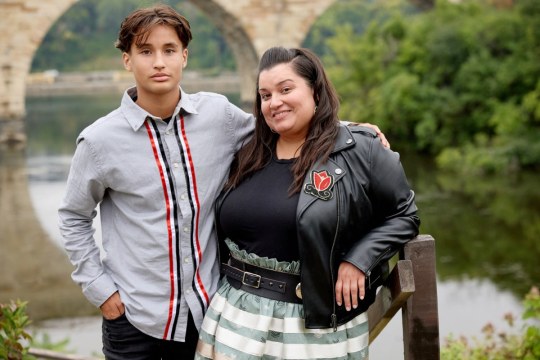
Pictured: Lucie Skjefte and son Animikii [Photo: Minnetonka]
In 2020, Minnetonka publicly apologized “for having benefited from selling Native-inspired designs without directly honoring Native culture or communities.” It also said that it was actively recruiting Native Americans to work at the company, reexamining its branding, looking for Native-owned businesses to partner with, continuing to support Native American nonprofits, and that it planned to collaborate with Native American artists and designers.
Benjamin partnered with the company on the first collaboration, a collection of hand-beaded hats, and then recruited the Minneapolis-based designer Lucie Skjefte, a citizen of the Red Lake Nation, who designed the beadwork for another moccasin style and a pair of slippers for the brand. Skjefte says that she felt comfortable working with the company knowing that it had already done work with Benjamin on reconciliation. And she wasn’t a stranger to the brand. “Our grandmothers and our mothers would always look for moccasins in a clutch kind of situation where they didn’t have a pair ready and available to make on their own—then they would buy Minnetonka mocs and walk into a traditional pow wow and wear them,” she says. Her mother, she says, who passed away in 2019, would have been “immensely proud” that Skjefte’s design work was part of the moccasins—and on the new version of the Thunderbird moccasin, one of the company’s top-selling styles.

[Photo: Minnetonka]
“I started thinking about all of those stories, and what resonated with me visually,” Skjefte says. The redesign, she says, is much more detailed and authentic than the previous version. “Through the redesign and beading process, we are actively reclaiming and reconnecting our Animikii or Thunderbird motif with its Indigenous roots,” she says. Skjefte will earn royalties for the design, and Minnetonka will also separately donate a portion of the sale of each shoe to Mni Sota Fund, a nonprofit that helps Native Americans in Minnesota get training and capital for home ownership and entrepreneurship.
Some companies go a step farther—Manitobah Mukluks, based in Canada, has an Indigenous founder and more than half Indigenous staff. (While Minnetonka is actively recruiting more Native American workers, the company says that employees self-report race and it can’t share any data about its current number of Indigenous employees.) Beyond its own line of products, Manitobah also has an online Indigenous Market that features artists who earn 100% of the profit for their work.
White Bear Moccasins, a Native-owned-and-made brand in Montana, makes moccasins from bison hide. Each custom pair can take six to eight hours to make; the shoes cost hundreds of dollars, though they can also be repaired and last as long as a lifetime, says owner Shauna White Bear. In interviews, White Bear has said that she wants “to take our craft back,” from companies like Minnetonka. But she also told Fast Company that she doesn’t think that Minnetonka, as a family-owned business, should have to lose its livelihood now and stop making moccasins.
The situation is arguably different for other fashion brands that might use a Native American symbol—or rip off a Native American design completely—on a single product that could easily be taken off the market. Benjamin says that she has also worked with other companies that have discontinued products.
She sees five steps in the process of reconciliation. First, the person or company who did wrong has to acknowledge the wrong. Then they need to publicly apologize, begin to change behavior, start to rebuild trust, and then, eventually, the wronged party might take the step of forgiveness. Right now, she says, Minnetonka is in the third phase of behavior change. The brand plans to continue to collaborate with Native American designers.
The company can be an example to others on how to listen and build true relationships, Benjamin says. “I think that’s the only way that these relationships are going to get any better—people have to sit down and talk about it,” she says. “People have to be real. People have to apologize. They have to want to reconcile with people.”
The leadership at Minnetonka can also be allies in pushing other companies to do better. “My voice is important at the table as an Indigenous woman,” Benjamin says. “Lucie’s voice is important. But at tables where there’s a majority of people that aren’t Indigenous, sometimes those allies’ voices are more powerful in those spaces, because that means that they’ve signed on to what we’re saying. The power has signed on to moving forward and we agree with ‘Yes, this was wrong.’ That’s the stuff that’s going to change [things] right there.”"
-via FastCompany, February 7, 2024
#indigenous#indigenous artists#indigenous art#moccasins#thunderbird#native american#native american art#cultural appropriation#indigenous peoples#cultural representation#minnesota#minnetonka#minneapolis#red lake nation#ojibwe#anishinaabe#reconciliation#fashion#fashion news#good news#hope#indigenous designers#native artist#indigenous artist
2K notes
·
View notes
Text
Heisei/Reiwa Kamen Rider Bike Riding Time research

Hello there! Does anyone remember from a little while back when this image was going around?
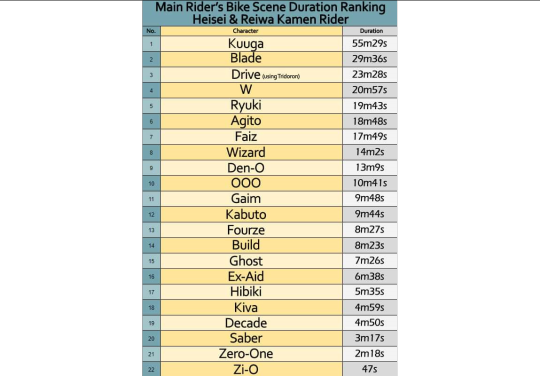
For a while, at least in fan communities I frequented; this was quite infamous for showing just how sharp a decline Kamen Rider's namesake had become in the last few years, with the absolute nadir of the Heisei 20th anniversary Kamen Rider using his bike for a total of 47 seconds (and also, on the other end; just how much Kuuga would not get off his bike)
Obviously, it's been a few years since Saber now; and I've found myself wondering from time to time exactly how the Riders since then have fared, especially since both Geats and Gotchard have garnered a reputation of sorts for putting a bit more emphasis on the bikes and feeling like they have more screentime than your Zero-Ones and your Sabers.
So! I went looking and found the source. This extremely dedicated Japanese poster called Yamashita Radio who of course I will be basing the majority of this on, including his rules and his counting. And when I say 'dedicated' I mean that at one point he lost all his data so he just counted Kuuga through Saber all over again. MAD respect for this man! I highly recommend a full readthrough of this 5-part post at one point because it's very impressive and interesting stuff in my opinion
One other interesting point is that that chart there? That's main rider only; and also includes any riding they did as civilians. There is a separate chart for all motorbike riding in the show as a whole; including other riders, including monsters, including even just random civilians! For posterity, I think it's important to post that chart for comparison with the main rider one -- I've colour coded here so that red is Heisei 1 (Kuuga-Decade), green is Heisei 2 (W-Zi-O) and yellow is Reiwa (Zero-One onwards). Main rider only on the left, all biking on the right.
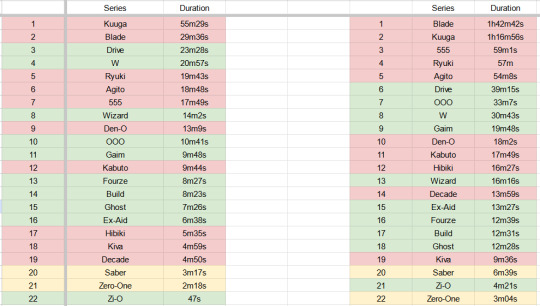
Up front there are some absolutely fascinating observations to make here - Zero-One had the least bike scenes of any show! Brand new era of Kamen Rider! - but I think I've talked about the past enough. With all this said and what I feel is a very important plug to make, let's get into the meat of this -- how do Revice, Geats and Gotchard compare to previous shows?
Rules
... okay, yeah, sure; let's quickly establish a baseline first. As I'm going off of Yamashita's work, I'm also going by all his rules; it's a good thing I agree with all of them because I kinda didn't want to completely redo the count of every season!
TV Show ONLY! No movies, no TTFC specials, no HBVs, no V-Cinema, none of it. The main reason given is that, uh, Paradise Lost has a 100+ bike scene near the start so that's too much of an advantage -- fair enough! Personally I also think it's more interesting, because movies generally have more budget and allowances for bike scenes so those tend to be the same. Maybe a separate count would still be interesting, but I think including movies would flatten out the times too much and make the data pretty uninteresting
No openings! Agito has too much of an advantage
Non-transformed states count the same as transformed states. Godai riding a bike is the same as Kuuga riding a bike.
All motorcycles are treated equally! Mopeds and even CG scenes and bikes are allowed
Other vehicles such as cars, trains and even bicycles and hoverbikes are excluded. Two big exceptions are made for Drive and Revice as they do not have a main motorbike otherwise, but this does exclude things like Gaim's Dandeliner, many of the Oni in Hibiki's transport vehicles, Den-O's Den-Liner, Gotchard's Steamliner and Madwheel and Decade's Agito Slider
Transformations of the bike still count as long as it's being ridden. The Boostriker turns into fox mode while you're riding it? That's fair game
Flashbacks and other repeat footage ("previously on" segments etc) don't count of course. But in cases where it's clearly stock footage but it's still a new event, like the many Ryuki Rideshooter scenes, that's still counted
Count from the moment the bike is straddled to the moment the bike is gotten off, and everything in between. Scenes where the bike isn't technically visible - such as close-ups of the rider's face, or cutting to another character's reaction - are still counted if it's all the same scene
Revice

3m21s (2m23s for Revi only)
Oh lucky me, this was actually done for me! Yamashita made a small update after Revice finished to add this. I just went over and double checked it.
At 3m21s, Revice is at this point the series with the 2nd least amount of bike riding; above Zero-One and below Zi-O. For Revi alone he's in 3rd least; above Zero-One and below Saber. Happy 50th anniversary!
An interesting note here is that Ikki never rides Vice Ptera untransformed -- concerns over the actor's safety, maybe? Daiji also pulls in 58 seconds for the show on his own motorbike, but abandons it completely after episode 13; only bringing it back for the summer movie (which is also the only place he rode it as Live). Interestingly, the 12 seconds he rides it with Sakura in episode 13 is the only time he uses it in the show after becoming a Rider. The skateboarding scene in episode 7 for Jackal Form goes on for over a minute, but unfortunately can't count for this...
I think most people expected Revice to place quite low, though. So let's move on to a show I think a lot of people expect to place higher.
Geats

4m05s (3m45s for Geats only)
I keep repeating it, but this is a show where it seemed a lot of people got the impression of the bike having more importance than before. I think there's a lot of aspects that come together into that -- the bike being tied to a specific 'special' item that's even part of the main rider's main form, the upgrade forms going off of that, and the bike being used in prominent scenes including in the first episode. Geats even arrives on it in his Revice summer movie cameo!
But ultimately if you look at riding time, Geats ends up in 3rd place for overall bike time; above Revice and below Zi-O, while for main rider only Ace ends up in 5th last; above Saber and below Decade. As such he ends up being the main Reiwa Rider to use his bike the most.
This is where I started splitting main rider and untransformed rider in my personal tracking charts, just for fun -- I actually couldn't do that for Revice because as said Ikki never rides anything untransformed except his bicycle. Until episode 11 Ace actually just slightly edged out Geats for having more bike time which was enjoyable to see.
A very interesting thing happens in regards to the Boostriker's transformed state. I decided not to include finishers involving it unless the Rider is specifically riding it -- and the one and only one to do so was Buffa in episode 6, accounting for every single second he rode the machine. He had a penchant for using the buckles' weapons in ways he wasn't supposed to, and he kept up that rule even when the 'weapon' was a bike.
Geats spends a decent amount of time in the final episode sitting on his bike while talking to Regad and the other Riders, and that really saved the show's overall times.
Gotchard
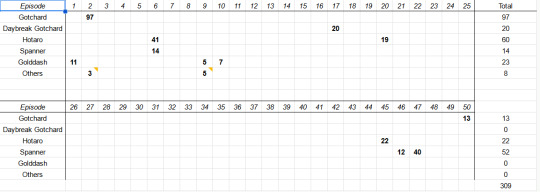
5m09s (2m32s for Gotchard alone)
According to production blogs, Gotchard had a stated aim of using the bike more. Unfortunately it seems this didn't manifest itself in a very major way... but I think we did see more interesting uses of it! Spanner has his own bike (that like Daiji, he never rides transformed!), there's a version of Golddash from the future, other characters including Golddash itself ride rather than Hotaro at multiple points!
For 'others', the 3 seconds in Episode 2 is when Minato rolls up to deliver Golddash to Hotaro personally. Episode 9's 5 seconds have Renge (with Sabimaru in the back) riding it to deliver Hotaro's cards to him in Kyoto.
Spanner shockingly saved the series' overall time here in a similar way to final episode Ace, by sitting on his for an extended period of time during his conversation with Lachesis at the start of episode 47.
While it's not a very long scene nor did it change anything for the rankings, the bike scene in the final episode that just aired is notable for an extremely rare instance of a Rider Machine being ridden by a Kamen Rider's final form. To my knowledge this has previously only been done by Agito, Den-O and Revice (the latter in a movie). Fittingly for a show where part of the direction was inspired by Agito, both Agito and Gotchard do this Final Form bike scene in their final episodes.
And now, for the final count...
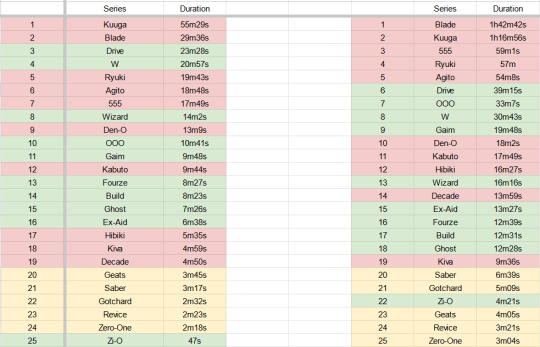
Gotchard ended up in 21st for overall bike time between Zi-O and Saber, but this was largely due to other characters; so Hotaro alone ended up in 22nd between Revice and Saber.
Overall we're now 5 shows in instead of 2, we can indeed see a very large dropoff in the Reiwa Era -- including Zi-O, the most recent 6 shows are all at the bottom of the list. This is especially notable when The next most recent series, Build, had 12m31s; almost double that of Saber's -- and this wasn't uncommon, with Ghost and Ex-Aid sharing similar times.
This was the main thrust of my research... but what say we go on a little addendum? Because when I mentioned Yamashita updated his post to include Revice in 2022, there was... one other series he saw fit to do a count for. One that was only halfway through, but nonetheless saw an impressive amount of bike riding time. He only got halfway, but what say I finish the job out of pure interest?
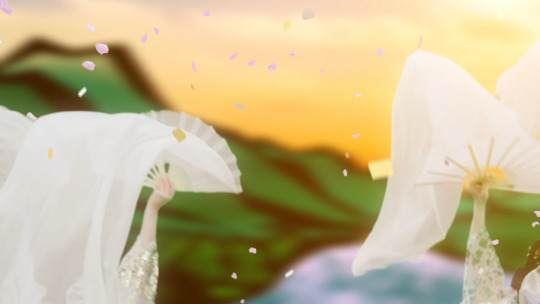


It is "Avataro Sentai Donbrothers"

The extremely normal 2022 entry into the Super Sentai series has a number of bike scenes. Some you may expect from Don Momotaro riding his CGI Enyarideon on his Palanquin for much of the first cour. Some of you might say that CGI shouldn't count, it's easy enough to animate together a scene than deal with road laws and such -- but does Kijibrother not count? Does Inubrother not count? Do none of the mech scenes count? It's a festival, people. Let's enjoy it.
Even aside from the CGI, Yamashita noted halfway through the show; that can't quite account for everything else. Sonoi has a bike he rides in multiple episodes, every time with a wheelie. Inuzuka twice within 4 episodes steals a bike and almost runs people over with it, as is perfectly fine for a hero. Don Kaito shows up with his own motorbike to promote his new book, which you should buy. For a show where it's not even in the name and for recent Sentai, there's an awful lot of riding going on.
Yamashita in his post speculates that part of this is Inoue's own habits -- as a man whose Toku experience largely consists of regularly writing for Kamen Rider in the 00s, it's natural to expect he would be inclined to write something like "Inubrother escapes the scene on a motorcycle..." as if it was second nature; as if that's nothing special for a modern show.
And I would be inclined to believe that... as such a habit is something that would likely get ironed out after a while; and sure enough, while bike scenes are frequent for the first half of the show, they disappear entirely from episode 23 to 43. It is at this point in my own count I thought we would simply never see a large bike scene from the show again, and the sheer fun of counting up Donbrothers would be lost.
And then... he appeared.
My saviour from the future.
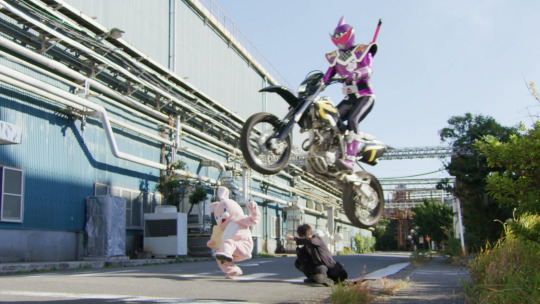
With a full uninterrupted 1 minute 15 second bike scene
I could hardly believe what I was seeing. I remembered the future episode but I had completely forgotten this was a part of it. When I started timing this episode I was leaving the house fairly shortly and I figured like the past 20 episodes this would be easy enough to count, and I was utterly bewildered. I should never have disbelieved for a moment.
With all that said... where does Donbrothers end up in full?

7m21s (4m23s for Don Momotaro alone)
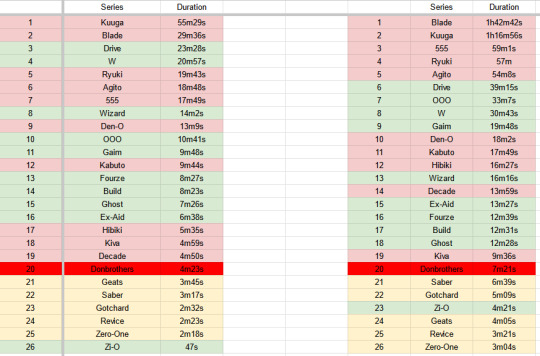
This overwhelming record easily puts both Donbrothers and Don Momotaro in 20th place of their respective charts; beating all Reiwa Riders and Zi-O -- with Don Momotaro even coming close to dethroning Kamen Rider Decade's riding time!
This is where we stand, my companions. In an era where Kamen Rider's biking time is lower than ever before and shows no sign of significant recovery, Donbrothers swoops in to steal its glory. Never lose faith. The festival never ends
211 notes
·
View notes
Note
Hi! I'm trying to get into writing twst fanfiction, but I'm having some trouble with keeping the boys in-character. What do you think are their base traits? Like, what's the foundation of their personalities?

Hello! I spent a long time debating about whether to respond to this ask or not. Ultimately, a lot of the thoughts I would include in my response are the same as what I have already expressed here. However, I've noticed that this has become sort of a recurring issue, so I'd like to address this more seriously.
I've recently been getting a lot of people requesting that I basically tell them how to write the Twst characters. Tens and tens of them, in fact (too many to include all in one post). Sometimes it's an ask like, "please list out strengths/weaknesses or a summary of their character traits", and sometimes it's more specific like, "here is a prompt I am working on; how do you think [character] would act in this situation?" I'm NOT comfortable with either type of ask and refuse to answer asks of this nature.
I want to be clear: this is NOT the same as asking for general writing advice; this is literally just asking to be spoon-fed the answers. There is a difference between seeking advice on how to overcome writer's block or asking what are techniques to show, don't tell (which is general writing advice) versus asking someone to specifically instruct them on how to write Leona Kingscholar from the hit Disney mobile game Twisted Wonderland. The former is okay with me, while the latter is not.
While I am flattered that people care about my opinion and hold it in high regard, I am not here to be a cheat sheet, and nor are my opinions the "most correct". There is no single "correct" way to write a character, and even if there was, it's certainly not mine. Only the Twst devs themselves are the "most correct", as whatever they produce is what ends up as canon.
As I have said in my previous post on this topic, having someone else tell you how to write does little to help you. Writing is a skill, and skills are not inherent. They are something you train in, practice, and learn. Looking at a bunch of adjectives will not help you write or understand the characters any better than you currently do. If anything, it just means you don’t develop or practice your critical analysis skills. In a worse-case scenario, it devalues what a writer does, as it places the burden on them to condense what they know into a laundry list of characterization--as if it doesn't take us tons of time to hone those writing skills. The only real way to get the results you want is to do your own research, develop your own interpretations, and practice, practice, practice. There is no magic pill or shortcut or streamlining or easy way to do it and come out with a quality result. You have to be willing to put in the time and the effort to learn a skill, and that extends to writing, be it for this fandom, another fandom, or even for non-fandom writing. Think about it like this: when you're writing a good research paper, do you go and ask a single other source to gather all your data and summarize it for you? Of course not. You have to go out and manually collect the resources, do the reading, take notes, and gain an understanding of those resources. Then you use your newfound knowledge to summarize and to synthesize your own conclusions in your research paper. The same logic applies for writing in fandom.
I'm not sure why there is this sudden interest in shortcuts. Is it social media shortening our attention spans? Is it the rise of A.I. like ChatGPT making people more reliant on and more comfortable with summaries? Is it that people are concerned with nailing characterization or instant success the first time around? Is it that the internet's so much crueler with comments + feedback that we want to avoid OOC-ness as much as possible? Is it that I just so happen to like talking about character analysis so people think I must know everything? It could be any of these reasons or a combination of them--but whatever the reasoning is, it still leaves a bad taste in my mouth. It's concerning to me that it seems like people are becoming less and less interested in thinking for themselves and instead are increasingly reliant on others telling them how to create. You NEED to fail and get stuff wrong. You NEED to be able to have the courage to try things on your own. Don't be afraid of failure--failure isn't inherently a bad thing, it is how we learn, grow, and shape our own styles and ways of thinking! I definitely was not perfect when I first started out. I had to fail and stumble and struggle to get my craft to where it is today. So did every single one of your favorite creators. Artists had stick figures, writers had their first words. No artist or writer started off making masterpieces. Arguably, they still don't. Every creator is continuously learning and trying to improve their craft. It's not as though they hit perfection one day and decided to stay stagnant. I feel that it devalues what we make when we try to boil down all the skill we've developed into easy "answer keys" for others to digest. Again, you can ask all you want and seek out as many shortcuts as you like, but that's not going to be properly absorbed into your brain unless you walk the walk for yourself. You can't assume that learning these things will be as easy as reading a summary, memorizing a tutorial, figuring out what brush someone uses, etc.--it wasn't for the people you're asking for this advice from either. Failing is normal and expected. You will also never be able to create something that pleases everyone or something that everyone agrees with--so instead of trying to appeal to an unseen audience, please focus on creating what makes you happy. You have your own creative journeys ahead of you, so don't be scared to walk that road! It can be tough and you'll hit roadblocks and challenges--but overcome them, and you'll become even stronger and more skilled than you were before.
Best of luck!
#disney twst#disney twisted wonderland#twst#twisted wonderland#notes from the writing raven#advice#question
91 notes
·
View notes
Text
birthday revelations / crosshair x gn!reader
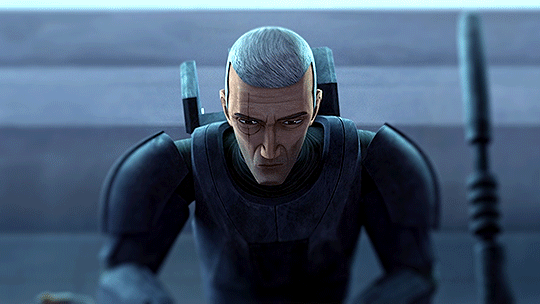
pairing: crosshair x gn!reader (no y/n). reader has a nickname.
description: crosshair discovers it's your birthday, and in an effort to try and understand birthdays, he gets you a gift.
word count: 3,793
warnings: none. crosshair ovethinks a lot
Another request! Maybe not technically a request, but @starrylothcat sent in an ask for an ask prompt and said it would be nice to see me write a fic where crosshair buys a gift for the reader for their birthday or christmas and it's been stuck in my head since! so here you go! i hope i did it justice!
also posted this on ao3. feedback is welcomed, reblogs are appreciated <3

Crosshair didn’t like crowds. He gritted his teeth as he walked alone through the market on Sorgan, sidestepping people as they entered his path. It was noisy, but that didn’t bother him so much. Vendors called out to passersby, promoting their various goods for purchase with enthusiasm. Voices chattered and laughed. The smell of food wafted through Crosshair’s nose and his stomach tightened with hunger. Rations were poor choices compared to the sizzling of flavourful meat on grills, but he didn’t have enough credits to buy himself something to eat.
He only had enough to buy something for you.
He had been helping Tech with cataloguing files when he saw one on their nat-born medic. You had joined Clone Force 99 just over half a standard cycle ago with your plucky yet kind attitude, falling into the group dynamic easier than Crosshair had thought. Sure, it had taken some adjustment for him and his brothers to become used to another presence they had not grown up with, but it was inevitable you would eventually find your place in the team. You were hardworking, strong and compassionate. You paid attention to each of his brothers, giving them your undivided focus during conversation and indulging them in questions about what they were doing or their chosen skill. He had watched you talk with Tech about data decryption, Wrecker about proton-based explosives, Hunter about tracking strategies, Echo about ARC trooper training, and of course, him about sharpshooting.
He recalled the way you sat next to him for the first time on his bunk during their time in Hyperspace. He had disassembled part of his Firepuncher rifle, readjusting the scope and the barrel after it had unexpectedly jammed on their previous mission. He’d been annoyed – his prized weapon never faltered, and he was trying to figure out why it had failed on him when the thin mattress dipped next to him, and you asked what he was doing. When he’d given a particularly surly response, you nodded and then just continued to watch him. His eyes had slid to you.
“Can I help you with anything else?” He hadn’t meant it to sound so icy, but he had been frustrated with this rifle, with himself.
“Can you…explain what you’re doing?” you had asked hopefully.
He had looked at you sceptically. “Why?”
You just shrugged. “It looks interesting.”
He had studied your expression, trying to discern if you were being genuine. But you were. You always were with things like this.
So, he explained what he was doing, answered your questions and by the time his weapon was fixed, he didn’t even really remember his initial annoyance. You had smiled at him, your mouth stretching in a way that made your eyes light up. He felt a little flicker of something in his stomach before it was promptly extinguished.
Since then, you have spent time with him like that more often. Not just when he was cleaning his rifle, but other things. Like throwing Lula back and forth across the bunks as you both talked, joking about things that happened on missions. Sharing looks over briefings. Stealing Wrecker’s snacks.
But his favourite time with you was drawing on your datapad and trying to guess what the other was drawing. He had learnt you liked to draw and enjoyed drawing out something other than a medical diagram. He felt a sense of pride in making you laugh so hard you cried with his silly caricatures during long hyperspace trips. Exaggerated doodles of his brothers, tookas and the like, a portrait of you with a funny expression. You liked to draw him with a smile too big for his face, chuckling as you drew and then collapsing into laughter when you showed him. It always made the thing in his stomach flicker.
He really liked having you around.
So, when he came across your file when helping Tech, he couldn’t help but open it. You had told them all any information they had asked for, and information they had not. There wasn’t really anything you kept secret. But when he saw your ID holo looking particularly embarrassing: with wide eyes and a half-formed expression – like you were taken off guard by the photo, the corner of his mouth twisted up in an impish smirk.
He had intended to tease you about it; set the holo to the show on every Marauder screen so it was everywhere.
He opened the file to take a copy of the holo when he spotted details about your age and date of birth.
He frowned at the date. “Tech, what is today’s galactic date?”
Tech looked up from his datapad, adjusting his goggles before rattling off the date. “Why?”
He said your name before telling him, “It’s their birthday tomorrow.”
“Oh.” Tech blinked.
Age and birthdays were almost foreign concepts to clones. With accelerated aging and growing in a capsule, they didn’t really matter to them. Awkward to calculate, they weren’t celebrated. Crosshair had no idea when he had been ‘birthed’ or decanted, and if the Kaminoans documented such dates, then it was classified information. He knew his chronological age, but his biological age was a little murky. He knew he was a “mature clone”, however with the accelerated aging, he didn’t know where exactly he stood. None of their brothers knew any of these details. It was normal for them.
He read the date and your age. What would it be like to be so sure of something like that? To be sure of the parts that made up who you were?
Crosshair cleared his throat and closed the file without even copying the ID holo. He frowned to himself. Maybe he should’ve asked you about it before, but birthdays weren’t a part of his world, so he hadn’t thought to. But they were important to nat-borns, weren’t they? At least that’s what they’d all been told during their training modules.
When he lay in his bunk that night, he circled his mind for all he knew about birthday traditions. Gatherings. Food. Gifts. Would you like all that? Did you like all that? You seemed like you would. He didn’t know if it was something he would enjoy if he had a birthday…it didn’t really seem like his thing, but maybe he would. He would never know. He thought that Wrecker might be the only one who would enjoy a birthday. Maybe Echo too if you did it right. Same with Hunter.
But you hadn’t said anything about your birthday.
He had tossed and turned. You were part of their squad. You cared. Listened. Laughed. Did you not feel you could share the date with them? He didn’t know, and a part of him felt a little hurt that you might not feel you could. Were you not friends? Crosshair didn’t have many friends, but he knew they were supposed to tell each other things.
He turned again, crossing his arms against his chest as he faced the wall. Why did he even care? If you didn’t want to tell him it was your birthday, fine. He wouldn’t mention it.
He squeezed his eyes shut before sitting up on his elbows and craned his head to see you sleeping in your bunk. Through the darkness, his enhanced eyes saw you curled in yourself, and your nose twitched as you breathed deep and evenly. Something in his chest pinched. He sighed before laying back down and pulling the thin blanket over his head.
Now, as he found himself in this market the next day, he wondered what he was even doing here.
Once they had landed on Sorgan, they completed their mission easily with no complications. But Crosshair was still distracted by your birthday. You hadn’t even said anything when everyone woke up this morning. Just acted like it was any other day. You had just smiled at him as you tucked into a ration bar, saying good morning before throwing one to him to eat.
It puzzled him.
When you all started walking back to the Marauder after the mission, Hunter could tell something was up with him, nudging his shoulder.
“You alright?”
Crosshair had scowled at his brother. “…Yes.”
“You look deep in thought,” Hunter pointed out, falling into step with him.
Crosshair broke his gaze and looked away, back towards where they came, to the village they had just liberated. The thought had barely formed before he said, “Do we have time before the next mission?”
Hunter’s surprise showed in his voice. “We have a couple of hours, why?”
“I’ll be back later,” Crosshair walked off in the direction of the village before Hunter could say anything. His long legs carried him to the marketplace, where he stood now amongst the bustling bodies.
He just couldn’t get your birthday out of his stupid head; that you hadn’t said anything because clones didn’t celebrate birthdays. Just because he didn’t understand them, doesn’t mean he couldn’t try…for you.
He started combing through the vendors, most of which were finishing up resetting their stands after they fled suddenly several days prior. He moved from stall to stall, gazing at the different items over people's heads. Kriff, what were you even supposed to buy people for birthdays? Something they needed? Something they wanted? It was all a little overwhelming. And Crosshair didn’t get overwhelmed.
“Looking for something in particular, my friend?”
Crosshair startled and looked up to see the vendor, a greying man with a wrinkled face, horns protruding from his forehead and curled up in an elegant spiral shape.
Crosshair frowned, clearing his throat. “It’s…my friend's birthday today.”
The man’s face lit up. “Wonderful! Birthdays are special.”
Crosshair’s mouth tightened as the man continued to speak. “What were you thinking of gifting them?”
The hairs on Crosshair’s neck stood up with nerves. “I…I don’t know.”
The man’s face lit up. “Perhaps I can help.”
The man then went through the different items at his stand. He held up scarves, strings of beads, and handmade pottery. Crosshair thought they were all nice enough, but he wasn’t swimming in credits. And none of the items really felt like you. The vendor was patient, more patient than he should’ve been. Either he really wanted to help or was desperate for a sale in a competitive marketplace.
After many minutes and many items, Crosshair felt himself gradually stiffening, becoming more and more on edge and uncomfortable. He felt so out of his depth. He was always so sure of everything, and trying to do this thing he had no experience in, made him more vulnerable than he had in a long time. It was not a feeling he felt comfortable with. Never had been.
And as much as he liked you, maybe this was all a stupid idea. You hadn’t mentioned your birthday for a reason. He shouldn’t bring it up. If he did, he’d have to explain how he found out…and he didn’t want to go through that awkwardness. He was about to open his mouth and tell the over-enthusiastic vendor: thank you, but he wouldn’t bother with a gift, when the vendor clapped his hands loudly, making Crosshair jump.
“I may have something back here, hold on,” he said as he turned away to rifle noisily through a crate behind him.
Crosshair felt his fist curl at his sides, and this should’ve been his opening to slide away unnoticed until he looked down and saw a brown leather book. Crosshair halted and lifted a gloved hand to the soft worn cover, running his fingers over the engravings in the bound leather. He opened the cover, seeing it was a blank notebook, and it had a writing implement tucked into the spine. Not many people recorded things the traditional way anymore; datapads were much more efficient and stored more information than the pages of a notebook. He flicked through the pages, fanning them with his thumb. The dust drifted up and it was a smell he didn’t recognise, but he supposed it was the smell of paper.
“That’s a good choice.”
Crosshair retracted his hand as if he was a cadet being scolded, and looked up at the vendor, who held an oversized pot that would break the second it came aboard the Marauder.
“That would be a perfect gift,” the vendor continued, nodding at the notebook.
Crosshair looked at him before picking up the notebook – more surely this time, and turned it over in his hands. He imagined you in your bunk, scribbling in it at night with a torch in one hand. He imagined you keeping it under your pillow for safekeeping. He imagined you doodling in it, showing him your drawings with that smile on your face. He imagined drawing in it with you. The corner of his mouth twitched upward.
“How much?” Crosshair asked.
“It’s yours.”
Crosshair’s head snapped towards the vendor. “What?”
The vendor waved him away. “Take it.”
Crosshair blinked, confused. “…I have to pay you.”
“No, you don’t. I’ve been trying to sell that for years. You’d be doing me a favour.”
Crosshair furrowed his brow. “…Isn’t the customer supposed to be right?”
The vendor barked out a laugh. “Not this time, my friend.”
Crosshair dug into his pocket anyway and pulled out half the credits. “For your patience…at least.”
The vendor chuckled and took them. “Thank you. I hope your friend likes it.”
Crosshair didn’t respond as the man turned away, placing the pot down before calling out to other marketgoers, trying to entice them.
Crosshair walked back through the market, the notebook feeling heavy in his hand. Leaving the village, he made his way back to the Marauder, thoughts swimming in his head.
Kriff, what if you hated it? Or thought it was stupid? What if all his knowledge on birthdays was completely inaccurate and you would think him strange for giving you something? Or what if you just thought he was weird for getting you something at all?
Crosshair’s grip on the notebook tightened. He just wanted to do something nice. Like you always did for them. But this is why he avoided it. It was so vulnerable being nice. Being nice left you open for hurt, open for aching. It was much easier to keep it at bay, to restrict it. To hide it behind actions inconspicuously where it wasn’t out in the open. Being so open with it for you…he wouldn’t admit it out loud, but it scared him. The doubt crept in. Crosshair had conviction and confidence, and he wasn’t used to it wavering like this.
He was just about ready to throw the notebook into a bush and never speak of it again when he heard your voice ring out from the steps of the Marauder.
“Crosshair!”
You placed your datapad down and ran over to him. He hid the notebook behind his back with both hands, gripping it so hard he knew his knuckles would be white as you approached him with a smile.
“Hey,” he said, hoping he sounded normal.
“Where’d you go? You disappeared after the mission.”
“I was just…looking for something,” he said carefully. Dank farrik, how was he supposed to do this? He thought he might just leave it on your bunk when you were distracted with a little note written inside the cover saying, ‘Happy Birthday’. That way he could avoid your reaction when you saw it. He didn’t even know how to get into the Marauder with it now that you were here in front of him.
You tilted your head with a quizzical smile. “Looking for something?”
Crosshair nodded. “I couldn’t find it,” he lied.
“Oh…okay,” you looked at him weirdly. Would you look at him like that when you saw his gift?
Crosshair nodded to the Marauder, desperate to get on board and stow the notebook away until he could leave it on your bunk. “Should we go inside?”
You looked at him, narrowing your eyes. “What are you hiding?”
“I’m not hiding anything, meshurok,” he lied, his grip tightening again.
“Yes, you are,” you sidestepped him to look behind him and he leapt out of the way. You grinned. “You are! What are you hiding, Cross? Why can’t I see?” you tried to chase him around, but Crosshair kept angling himself away. Kriff, he had never felt so stupid in his whole life.
“It’s nothing. Get your meddling hands away from me, you di’kut,” he walked backwards in a circle, his face and neck hot.
“Crosshair,” you chided, smiling at him. “Come on, is it really that bad?”
“Go away,” he grumbled, hands aching from holding the damned notebook so tight.
“Crosshair,” you said his name again, and your face was stretched in that playful grin that he’d unwillingly memorised. That thing in his stomach flickered again.
Then he remembered how you didn’t tell him about your birthday. And how you were friends, but you didn’t say anything about it. And how he had this unexplainable feeling he couldn’t name sitting in his stomach that compelled him to go to a village market and pick out a stupid gift for a birthday tradition he didn’t even understand just to do something nice for you the way you did for him and his brothers.
Crosshair’s expression flared and he shoved the notebook at your chest. You startled at your hand came up to grab it, sliding against his like a searing snake. He pulled his hand back and balled both at his sides as he gritted out, “Happy birthday.”
All he saw was your eyes were wide before he stalked off, almost stomping his way to the Marauder. His face burned, and embarrassment flooded his body. He felt so stupid, and he hated feeling stupid. He hated the feeling of being on the end of someone’s judgement. He hated knowing that he’d just been forced to make himself vulnerable. But mostly, he hated the feeling of you not trusting him with what was supposed to be the important parts of you.
“Crosshair!”
Your voice came from behind him, but he didn’t turn around. He was already planning different ways he could avoid you. He was going to lock himself in the ‘fresher until the next mission and make sure Hunter placed him on watch at opposite times to you. Whatever it took. His heart panged. You were one of the only people outside his brothers he liked. He would mourn the shared jokes and laughter, and time spent with you, knowing it couldn’t happen anymore.
“Crosshair, wait.”
He felt a hand on his arm pull him back. He swayed backwards, but he let you stop him. He avoided your gaze, scowl burning an outline in his brow as he stared off into the middle distance. Your hand stayed on his arm, and he felt it through the plastoid wrapped around his forearm, squeezing him there. It felt like part of him, and that made him feel both warm with content and spiked with anger simultaneously.
“Cross, please look at me,” your voice said quietly, and his heart squeezed. He slowly moved his gaze, looking down, then sliding his eyes to your bare hand on his arm before they lifted to your face. Your brows were slanted downwards, looking at him with such softness in your eyes he felt the flickering in his chest again.
“How did you…” your voice was soft and trailed off, notebook in your other hand.
“It doesn’t matter,” he dismissed with gritted words.
He felt your hand flex with your grip. “It does to me.”
He studied your face carefully before saying, “…I was helping Tech with cataloguing his files. I saw your birthday in yours.”
You continued looking at him with an indecipherable gaze and moved your hand slowly from his arm to his wrist, your bare fingertips brushing his gloves. You gently grazed his fingers as you let his hand drop softly. He watched you as you inspected the book, hands turning it over, fanning through the pages. He studied your expression, trying to discern what you thought, feeling anxiety grow in his stomach, his throat tightening. He felt something hot poke inside him as he watched your mouth turn up into a smile as you gazed at his gift.
“I’ve been so busy this year that I forgot about my birthday.”
Crosshair hoped he hid his surprise. You not telling him about your birthday…it was never about him. Of course, you had forgotten. The past six cycles had been a whirlwind for you trying to adjust to a soldier’s lifestyle, countless missions and trying to fit in with his brothers. His face burned again. He was a fool.
You looked up at him, a smirk itching the corners of your mouth. “Been too busy keeping you boys in line.”
Crosshair scoffed lightly, letting a puff of breath out of his nose. Your smile widened.
“This is a beautiful gift, Cross. Thank you for getting it for me,” you place your hand on his arm again, squeezing gently to show your appreciation He felt his heart lift and his cheeks redden, but this time, not in embarrassment.
He nodded at you. “I’m…glad you like it. I don’t have much experience with birthdays.”
Your smile touched the edges of your eyes. “That’s what makes it even more special.”
You reached up on your tip toes and wrapped your arms around his neck, embracing him. Crosshair stiffened in shock and surprise before he slowly wrapped his arms around your torso. His fingers grazed your sides, and there was something wildly comforting about holding you like this. He could feel the side of your face pressed into his neck, just below his ear, and your breath tickled the sliver of open skin not covered by his blacks. You were so warm. He felt you squeeze him gently and he didn’t stop himself from squeezing back.
You were his best friend, after all.
You pulled away, but not before you cupped his face and placed a kiss on his cheek. Crosshair flinched and his eyes widened as you lowered yourself back down on flat feet with one of the most joyful smiles he’d ever seen gracing your face. The action had surprised him more than anything else had.
“I’m going to show everyone what you got me,” you said before running off towards the Marauder.
“No, don’t, they’ll—” Crosshair started but you were already halfway up the gangplank. His brothers’ teasing was going to be ruthless.
He sighed, shaking his head before following you, that thing flickering in his chest. He didn’t understand it, but he didn’t try to extinguish it.
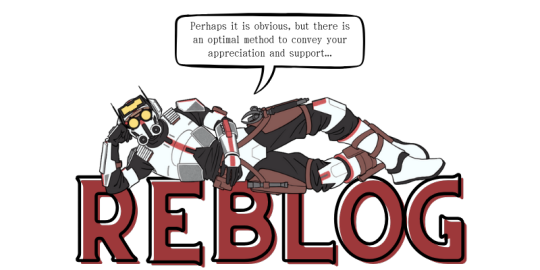
banner art by @vimse
mando'a / meshurok = gemstone thank you for reading! i did find this one slightly challenging bc it's very much crosshair in his head and i tried to write him how i thought he would react to a situation like this, but if it's a little OOC, i apologise! but i think he would react like this if someone he cared about didn't tell him something important about them; someone who was his friend and who he liked very much. i think he'd be kinda mad and hurt but he cares too much to not do anything at all. i have more gen requests on the way, so stay tuned if you're interested! <3
tags @starrylothcat @sinfulsalutations @moodymisty @nahoney22 @freesia-writes @nobody-expects-the-inquisitorius @bobaprint @crosshairsnose @jesseeka @thegalaxys-edge @snarky-mans-gf @chopper-base @wenalena @shredderwest @leavingkamino @rexamongthestars @r2d2staser @bluebird-dreams @pb-jellybeans @a-streakofblue @theawkwardartist12 @mylifeisactuallyamess @padawancat97 @littlecrowtime @jedipoodoo
i now have a TAGLIST FORM!! please fill it out if you'd like to be tagged in future fics! (please let me know if there are any issues with the form)
(if i've already been tagging you and you've interacted with my work consistently, you will still be tagged, but filling out the taglist will ensure you get tagged in the fics you want to be tagged in! it also makes it easier for me in the future when i post my work.)
#larissa writes#crosshair x reader#crosshair x reader fic#crosshair fluff#soft crosshair#tbb x reader#the bad batch crosshair#tbb crosshair fic#crosshair fic#the bad batch fluff#crosshair the bad batch#tbb crosshair#bad batch crosshair x reader#tbb crosshair x you
547 notes
·
View notes
Text
Also preserved in our archive
By Julia Doubleday
For many disabled and immunocompromised people, hospital settings are a significant threat to health and safety. Since the beginning of the COVID-19 pandemic, nosocomial- or healthcare acquired- SARS-COV-2 infections have been an additional risk for sick and vulnerable people seeking care. As of today, there have still been no updates to national-level guidance to reflect that SARS-COV-2 was determined to be airborne in 2021.
In 2020, such a risk was to be expected; hospitals were overwhelmed with patients, PPE was in short supply, proper isolation wasn’t always possible, and public health guidance about transmission was confusing and, it turns out, incorrect. Early on, the WHO confidently and wrongly asserted that COVID was not airborne; this decision led national health bodies to advise against full airborne precautions in healthcare.
But in the nearly five years since, one might assume that any patient visiting their local hospital could reasonably expect safety from infection with COVID-19. After all, we’ve had five years to study transmission, update guidelines, redesign infrastructure, upgrade ventilation, purchase PPE and train staff, right?
As a matter of fact, the CDC has yet to even issue updated infection control recommendations, much less have we seen implementation. The CDC did ask their infection control advisory body, HICPAC, to update the Guideline to Prevent Transmission of Pathogens in Healthcare Settings, last reviewed and updated in 2007. But when HICPAC submitted a first draft of the updated guidelines in November 2023, it was over loud public objections registering that draft’s inadequacy to control airborne infections.
Now, HICPAC is continuing to insist that surgical-style masks are equivalent to N-95 respirators as it pushes forward with its draft guidelines. This decision is emblematic of its commitment to preserving ineffective droplet-based infection control in spite of new information and evidence. While bizarre from a purely scientific standpoint, it makes more sense from a cultural, political and economic point of view.
I’ve written at length about the political and economic factors that led the WHO to immediately claim that COVID wasn’t airborne without the scientific evidence to do so in Spring 2020. Perhaps just as irresponsible as their early decision to spread this misinformation has been their subsequent reluctance to correct their mistake as loudly as they first made it, and ongoing refusal to unequivocally recommend airborne precautions in the years since.
This year, the WHO released a document that rescinded the previous distinction between “droplet” and “airborne” transmission of viruses. This represents progress, as new data showed that no viruses actually transmit solely via “droplets”- i.e., only via sneezes and coughs.
The evolution of the science was tracked beautifully in this Wired article. It’s astonishing that we had such basic science so wrong, for so long. But it’s critical to note that for decades, there was a large financial incentive against looking too closely at the claim that flus, colds, and other common viral and bacterial infections were being spread only via large “droplets.”
“Droplet” precautions are relatively cheap and easy compared to the more complex and expensive requirements of controlling fully airborne infections. If a virus spreads through coughs and sneezes, how do you prevent transmission? Well, we all remember early pandemic guidance. Loose fitting surgical masks, social distancing and keeping diners (or patients) six feet apart, putting up physical barriers to protect from spit, and simply washing hands and covering coughs and sneezes are all examples of droplet-based infection control measures.
But airborne spread is far more difficult to control. Now we’re talking about viruses spreading well beyond six feet, well beyond the radius of a single cough or sneeze. We’re talking about the virus spreading, not just via coughs and sneezes, but via the simple act of exhaling. And not only that, but because airborne particles are so light, they don’t quickly fall to the ground the way droplets do; instead, they can hang in the air, much like smoke. So now, a waiting room or crowded examining area full of patients with flus, colds and COVID suddenly represents a much more complicated and expensive infection control problem for a hospital.
Proper airborne infection control procedures are expensive, but they are not mysterious. Some changes would be relatively simple; masking with proper respirator-style masks, rather than surgical, is an obvious, necessary upgrade. New ventilation and filtration standards are a simple fix technologically, but require investment. Tools like Far UVC are exciting and could mean drastic leaps forward in both patient outcomes and occupational safety for HCW.
Most likely, in order to save money long term and make airborne infection control sustainable, hospitals themselves would be constructed with airborne infection control, patient isolation, airflow, ventilation, etc. as major priorities in the process of designing the infrastructure.
Airborne infection control would require, rather than tinkering at the edges of existing practices, a top-down rethinking of hospital protocols. How are patients being screened upon entry into the hospital? How can COVID, flu, RSV, etc. positive patients be protected from one another in a waiting room? Why are so many hospitals designed without windows in patient care areas?
Are you beginning to see how the economic incentives align against admitting the need for airborne infection control?
Let’s return to the WHO’s document, the one that rescinded the distinction between airborne and droplet spread. Instead, all viruses which spread through the air are now referred to as “infectious respiratory particles” or IRPs. The document encourages moving “beyond the dichotomy of previous terms known as ‘aerosols’ (generally smaller particles) and ‘droplets’ (generally larger particles).”
But problems arise when the WHO attempts to apply what we’ve learned practically- or rather, doesn’t attempt to apply it. Here, it balks at what would be a massive undertaking. As I reported previously, back in 2020, the WHO had been quick to claim:
“Would there be evidence of significant spread of SARS-CoV-2 as an airborne pathogen outside of the context of AGPs [aerosol-generating procedures], WHO would immediately revise its guidance and extend the recommendation of airborne precautions accordingly”
But in 2024, the WHO, now well aware that SARS-COV-2 is a fully airborne pathogen, adopts a new approach to infection control. It’s one totally unprecedented for any other pathogen in healthcare. They advise:
There is NO suggestion from this consultative process that to mitigate the risk of short-range airborne transmission full ‘airborne precautions’… should be used in all settings, for all pathogens, and by persons with any infection and disease risk levels where this mode of transmission is known or suspected. But conversely, some situations will require ‘airborne precautions’. This would clearly be inappropriate within a risk-based infection prevention approach where the balance of risks, including disease incidence, severity, individual and population immunity and many other factors, need to be considered, inclusive of legal, logistic, operational and financial consequences that have global implications regarding equity and access.
In other words, we shouldn’t always try to control airborne disease. That would be so hard and annoying! The document then goes to state that “risks” have to be balanced and goes on to list a bunch of factors that are never considered when it comes to the spread of other pathogens in healthcare.
When it comes to the spread of norovirus in healthcare, do doctors weigh whether to wash their hands, based on the local levels of diarrhea? When it comes to the spread of bacterial wound infections, do doctors clean surfaces based on how deadly they think the wound will be? I mean, if it’s not going to kill you, why bother, right? When it comes to bloodborne illnesses like HIV, do doctors no longer test for it because it’s now a treatable disease, no longer a death sentence?
Or, when you apply this logic to any other type of infection, is it clear that this is an absurd attempt to continue evading liability for nosocomial airborne infections in healthcare, including SARS-COV-2? People should not be infected with diseases in hospitals. Period. Regardless of disease severity. Of course, SARS-COV-2 is also incredibly severe for hospitalized patients; in Australia, nearly 1 in 10 patients who caught COVID in hospitals in 2022 and 2023 died. And these events are far from rare. Of 206 patients admitted for strokes in a hospital in Japan, 44 were infected with COVID-19. 6 of them - or 13% - died. Globally, we see the same thing over and over again: lack of airborne infection control, high rates of nosocomial infections, high rates of patient death.
The WHO chose to incorporate “balance of risks”, “disease severity”, “immunity,” and the rest of its laundry list of “factors”, not because it expects infection control bodies to do serious risk assessments, but in order to provide cover for them not to do any such thing. Universal airborne infection control would be expensive and disruptive so the WHO simply gives disease control bodies a series of “outs”.
This is the international backdrop against which the US has also been updating infection control guidance. The CDC, like other national public health bodies, does not directly report to the WHO; the WHO does not have enforcement power over the CDC. However, guidance from the WHO is taken seriously at the CDC, and experts at the CDC also influence the WHO.
The WHO’s document constructs a mile-wide loophole for HICPAC to drive through. Although HICPAC provides no evidence whatsoever that the characteristics of SARS-COV-2 (or flu, or RSV for that matter) would justify dropping airborne precautions, the language in the WHO document exists to justify dropping them in the face of the ongoing, global pandemic. Despite SARS-COV-2 being a systemic, multi-organ disease with the potential to cause long-term disability, and highly fatal when contracted by vulnerable patients, culturally and politically, we are treating it like a cold. HICPAC members are not making scientific decisions, but political ones.
The science on disease transmission has advanced tremendously since 2020. In a world that actually wanted to implement what we’ve learned from COVID, this would mean dramatically safer care for patients and healthier workplaces for HCWs. Instead, HICPAC does the opposite, working to ignore the advancements in scientific knowledge and fighting to keep infection control as similar as possible to the outdated droplet model of the pre-pandemic era.
For example, they advise that N95 respirators should be worn for “new and emerging pathogens,” but make an irrational distinction between these and other viruses that are already in circulation. You know, the ones that are actually, currently infecting patients. “Emerging/new” isn’t a type of transmission, so shouldn’t denote a type of infection control.
Even the CDC balked at HICPAC’s initial draft, sending it back with pointed questions about this bizarre distinction and other inadequate protections. It asked for clarification, stating:
Another issue relevant to preventing transmission through air is to make sure that a draft set of recommendations cannot be misread to suggest equivalency between facemasks and NIOSH Approved respirators, which is not scientifically correct nor the intent of the draft language. Although masks can provide some level of filtration, the level of filtration is not comparable to NIOSH Approved respirators.
Why would HICPAC equate surgical masks with respirators? HICPAC’s draft was not designed to protect patients; it was designed to protect the status quo and allow hospitals to continue to infect patients with COVID and other airborne diseases. It’s likely that the CDC’s decision to push back on this claim was influenced by the massive outpouring of public outrage at the draft, which was seen in both the public comments submitted and read at HICPAC’s meetings.
Additionally, both OSHA, the Occupational Safety and Health Administration, and NIOSH, the National Institute for Occupational Safety and Health, agree with both the CDC and patients that surgical masks are not sufficient protection. N95s are required to control airborne infections.
However, despite months of pushback, the tears of suffering and scared patients, the word of the experts who design respirators, as well as the input of occupational safety leaders, HICPAC remains unmoved on the subject.
In a series of votes held last month, HICPAC stuck to their guns. Lisa Baum of the New York State Nurses’ Association was the sole dissenting member of the committee, as reported by Judy Stone of Forbes. She not only voted against the anti-science equating of surgical and N95 masks, but also against allowing COVID positive staff to return to work 3 days after a positive test. The 3-day time frame has absolutely no scientific basis, and return to work should be based on negative tests, not on an arbitrary time window or symptoms. Since a quarter of all COVID cases are asymptomatic, staff should also be asymptomatically screened; they aren’t because hospitals don’t want staff taking time off. Again, these are economic, not scientific, decisions.
Putting these two votes together, HICPAC has voted to allow sick, infectious, COVID+ staff to go to work without proper PPE and infect fellow HCW and patients, in hospitals without proper ventilation and filtration. Patients who are infected in hospitals using outdated droplet precautions will have a 10% risk of death. Coworkers- even if fully vaccinated- will have a significant risk of developing a long-term health condition following their acute infection.
At a time when hospitals remain crushed by the ongoing burden of both COVID and post-COVID health problems, failing to protect workers is a particularly short-sighted decision. Studies have already shown that HCWs suffer unusually high rates of Long COVID, with a recent one in the UK finding a whopping 33.6% reporting symptoms, and 7.4% of respondents reporting an official diagnosis.
These decisions not only mean infected doctors and nurses returning to work actively ill; they also mean that hospitals will continue to reinforce false information about how COVID spreads, purposely miseducating doctors and nurses in their employ to save money.
The members of HICPAC understand that surgical masks aren’t really the equivalent of N95s, they simply believe HCWs are more likely to wear surgicals (they’ve explicitly stated such; this is not, incidentally, how infection control decisions should be made). But this reasoning is not shared with patient-care level HCWs. Instead, HCWs are told that surgical masks are a sufficient infection control measure for COVID-19 when infectious. When an informed patient seeking care tries to correct them, they are greeted with condescension; after all, the doctor’s information comes directly from the CDC.
Disabled and immunocompromised people relate stories of medical professionals who believe COVID spreads via droplets, who wear surgical masks instead of N95s, who draw curtains to prevent the spread of COVID and other viruses; in other words, they are continuing to adhere to outdated precautions. This is unsurprising, because they have never received accurate guidance reflecting our updated technical knowledge about how SARS-COV-2 and other common viruses actually spread.
They’ve never received updated information because the medical system does not want to spend money to protect workers or patients.
At the end of the day, this story is not about droplets and airborne particles as much as it is about dollars and cents. What sounds like an in-the-weeds scientific debate, is no more than a common tale of industry greed. We know- and have known- exactly what it would take to protect patients in healthcare settings. Instead, our leaders sit back and watch as day after day, more unnecessary infections and deaths accumulate. As day after day, more healthcare workers acquire illnesses at work which lead to staff shortages, worse patient outcomes, long-term departures, and the loss of talented, highly trained people from the field.
All of us, patients, doctors, nurses, and other healthcare staff alike, deserve medical leadership that will value our rights to safety in these settings. We deserve medical leadership that won’t actively try to slow scientific progress, and instead will welcome its arrival. We deserve to enter a hospital knowing we won’t be infected and killed because HICPAC would rather allow airborne nosocomial infections to continue on its watch than spend money preventing them.
Right now, the biggest factor protecting hospitals as their negligence rolls on into year five is the ignorance of the public. Most people have no idea how COVID and other viruses spread, have no idea that it’s so dangerous to contract COVID as a vulnerable patient (thanks to years of normalizing propaganda), and may themselves believe that social distancing or curtains prevent infections. This public ignorance is a deliberate tool which enables continued public health negligence on multiple fronts. Continuing to educate ourselves and each other is resistance when the state relies on ignorance to tamp down resistance to policies of mass infection and death.
#mask up#public health#wear a mask#pandemic#wear a respirator#covid#covid 19#still coviding#coronavirus#sars cov 2
43 notes
·
View notes
Text
Okay Alex Rider Nation. I need feedback. I said in a previous post that I've been working out what show!MI6 knows about Yassen Gregorovich and I've put together a little (extremely not little) Smithers presentation to ultimately be delivered in my snakehead treatment.
This is the first draft and I'm looking for fridge logic critique. Do Smithers and Jones' conclusions make sense with what they know? Did I miss any Yassen data (from the show) that they should've known about/that Smithers should've included.
Note: For Yassen's backstory I did take some key info from Snakehead and Russian Roulette and put them back together with consideration for how they'd fit into what the show has definitively laid out as self-contained facts. Internal consistency is more important to me than fidelity to the books (but I do love easter eggs).
With the casting of Yaseen Aroussi as young Yassen I decided to lean into making Yassen mixed-heritage. I also decided to address the fact that Gregorovich isn't a proper Russian surname by making it his middle name (and naming his father Grigory). I borrowed the surname I gave him from his childhood best friend in RR.
SMITHERS: Yassen Gregorovich. (pause for dramatic effect) Born Yaseen Grigoryevich Tretyakov in Moscow to Grigory and Hawa Tretyakov. Raised in Western Russia near Kursk--A place called Estrov--until it was destroyed in a fire that started in a nearby chemical plant. His father was killed in the initial explosion. His mother was exposed to hazardous chemicals and died of related complications in an evacuation center several months later. He was fourteen. JONES: I'm aware of all of this. He got onto our radar originally when he turned up in John Rider’s reports from one of Scorpia’s training facilities. SMITHERS: But before that he traveled almost a thousand kilometers to Moscow on his own, with no food or money. He spent the next three or four years in Moscow, living on the street and running errands for the local Mafiya. We still don’t know how he managed to find his way to Scorpia. JONES: Smithers. How long, exactly, have you been working on this? SMITHERS: Since Blunt lied to Alex about Gregorovich’s whereabouts. JONES: Two years. And why are you showing it to us now? SMITHERS: The man successfully faked his own death, then spent fifteen years doing whatever he pleased. And the reason we know he’s alive now is because he stopped to have a chat with Alex Rider. And despite that we still don’t know where in the world he currently is. CRAWLEY: Did Alex seem especially interested the other day when you mentioned him? SMITHERS: You noticed that as well, did you? Now, may I continue? JONES: (resigned) Go on.
(the timeline I decided on for Ian here is based on his having served in the parachute force for 12 years as stated in s1e1. If that's accurate, and he was 42 when he died, he wouldn't have been able to enter Special Operations until Alex was 4 or 5.
It's possible that the friend in Moscow wasn't Yassen at all, but:

I cannot be convinced that someone as upright and British as Ian Rider would speak this informally to someone he's never met before.
Unfortunately, Smithers couldn't possibly know about 'Yas', so I'm letting him make baseless conjecture about the friend in Moscow.)
SMITHERS: Going thru Ian Rider and Martin Wilby’s various and assorted records and communiques with a fine tooth comb, I found a few references here and there to a ‘friend in Moscow’ going back as far as 2010, which was not long after Ian received clearance to look at the Scorpia files. This may have been a coincidence but Ian was the only one of us who believed that Scorpia wasn’t gone and this could explain why. JONES: You’re suggesting that Ian knew Yassen was still alive all this time? SMITHERS: It’s possible. JONES: And that’s what got him killed. SMITHERS: Yes, that and Martin Wilby’s avarice. If my hypothesis is correct, it seems that Ian and Gregorovich had maintained a professional understanding for over a decade by that time. Then, only when Ian was on the cusp of finding proof that Scorpia was still active, Wilby was in place to prevent that from happening. JONES: And it would have been successful if not for Alex. SMITHERS: There was also the shooter that killed Alex’s clone outside of the school. Most likely also Gregorovich himself. And then Alex came to us again, desperately trying to convince us that he’d seen Gregorovich in Cornwall. And after he executed Simon Mariat and the five people in the hackerspace we lost track of him again, until– JONES: He shot Damian Cray and saved Alex’s life on board Air Force One.
SMITHERS: While wounded, I might add. We found quite a lot of Gregorovich’s blood just inside the cockpit. Ballistics confirmed that the shots that killed Cray were fired from that location, most likely in a supine position. Alex was confident in his characterization of Gregorovich’s motive. And in light of subsequent events, it seems very likely that Gregorovich did speak to him. Alex simply didn’t feel comfortable sharing the substance of that conversation with us. JONES: You believe Gregorovich sent Alex to Scorpia. That’s what you’re getting at with all of this. Alright. Let’s say I accept your premise. Why the biography? SMITHERS: You don’t see the similarity? Orphaned as teenagers. Forced to do incredible things to survive. And then Scorpia. But then we found out that Julia Rothman’s primary motive for wanting Alex at Invisible Sword was so she could watch him die. JONES: It would be rather out of character for Scorpia to sacrifice as large a payout as we can assume Cray’s operation would have netted them--not to mention reaping the subsequent economic and political consequences--just so they could personalize the murder of a teenager. Gregorovich must’ve been acting on his own cognizance. Scorpia likely doesn’t even know about his role in Cray’s death. SMITHERS: And then there’s the sniper. JONES: Sorry? SMITHERS: One of Julia Rothman’s people. His body was found on the roof opposite this building after Invisible Sword. The murder weapon, left at the scene, was the same Grach MP-443 that killed Damian Cray and Simon Mariat. JONES: That's right. With Gregorovich’s prints on it. SMITHERS: We’ve known that Scorpia discovered the truth about John Rider very quickly and had him, and his wife killed. The bomb on their plane. Could’ve even been Gregorovich that planted the bomb for all we know. Now that we know he’s been alive this whole time. Except... JONES: Except he didn’t know, did he? His loyalty was always to John Rider, and this whole time he never knew that John was one of us. Scorpia kept it from him, they must have. In his mind, Ian had been the disloyal one. But then he wasn’t at the Abbey during Invisible Sword. He must have discovered what Julia Rothman was planning for Alex, and with that discovery, the truth about John. And afterwards he’d have known Scorpia would want retribution. The only rational motive for killing the sniper is to protect Alex. And he left his weapon behind. He wanted us to know. SMITHERS: And there we have it.
#Alex Rider#Alex Rider TV#Yassen Gregorovich#Alex Rider Timeline#Alex Rider - Snakehead#There's a part two to this conversation but it's about stuff that happens after season 3 ends#Critique welcome#Thanks to akilah12902 for IDing the Grach#I wanted to sneak a grinch reference into this dialogue#but I restrained myself#everyone please applaud my self-restraint#the extremely unprofessional desire to hide a die hard or grinch reference somewhere in the script is ever present and unyielding
37 notes
·
View notes
Text
Heroes, Gods, and the Invisible Narrator
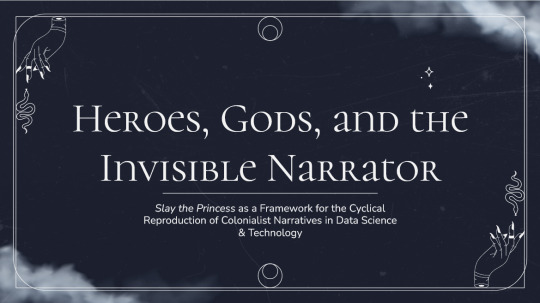
Slay the Princess as a Framework for the Cyclical Reproduction of Colonialist Narratives in Data Science & Technology
An Essay by FireflySummers
All images are captioned.
Content Warnings: Body Horror, Discussion of Racism and Colonialism
Spoilers for Slay the Princess (2023) by @abby-howard and Black Tabby Games.
If you enjoy this article, consider reading my guide to arguing against the use of AI image generators or the academic article it's based on.

Introduction: The Hero and the Princess
You're on a path in the woods, and at the end of that path is a cabin. And in the basement of that cabin is a Princess. You're here to slay her. If you don't, it will be the end of the world.
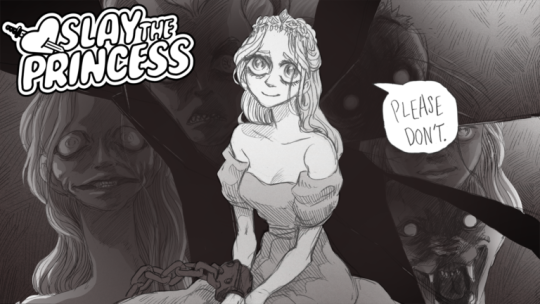
Slay the Princess is a 2023 indie horror game by Abby Howard and published through Black Tabby Games, with voice talent by Jonathan Sims (yes, that one) and Nichole Goodnight.
The game starts with you dropped without context in the middle of the woods. But that’s alright. The Narrator is here to guide you. You are the hero, you have your weapon, and you have a monster to slay.
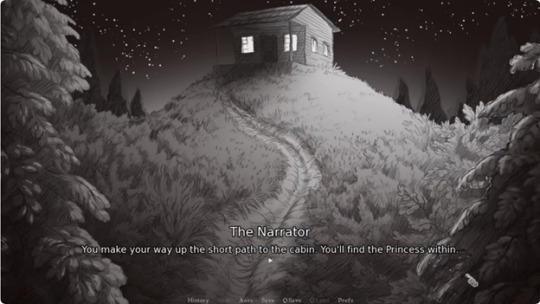
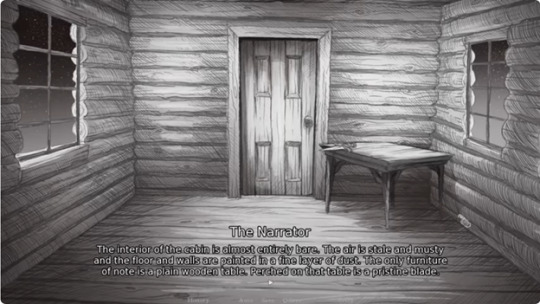
From there, it's the player's choice exactly how to proceed--whether that be listening to the voice of the narrator, or attempting to subvert him. You can kill her as instructed, or sit and chat, or even free her from her chains.
It doesn't matter.
Regardless of whether you are successful in your goal, you will inevitably (and often quite violently) die.
And then...
You are once again on a path in the woods.
The cycle repeats itself, the narrator seemingly none the wiser. But the woods are different, and so is the cabin. You're different, and worse... so is she.
Based on your actions in the previous loop, the princess has... changed. Distorted.
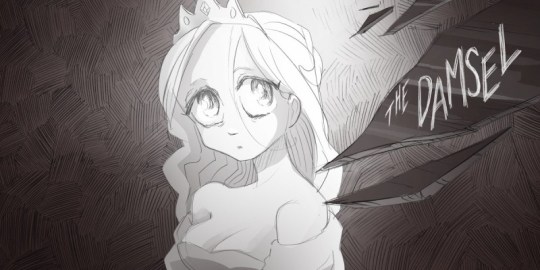
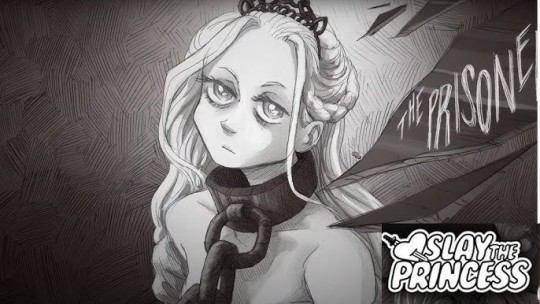
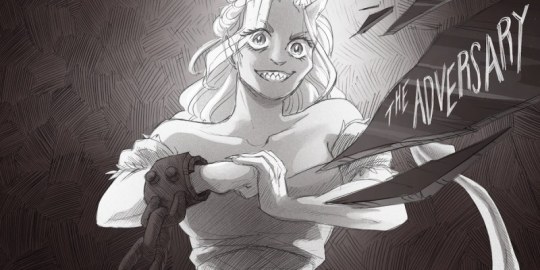
Had you attempted a daring rescue, she is now a damsel--sweet and submissive and already fallen in love with you.
Had you previously betrayed her, she has warped into something malicious and sinister, ready to repay your kindness in full.
But once again, it doesn't matter.
Because the no matter what you choose, no matter how the world around you contorts under the weight of repeated loops, it will always be you and the princess.
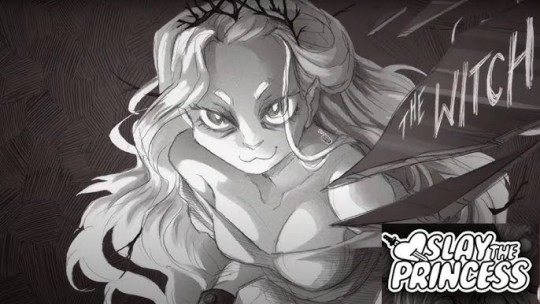
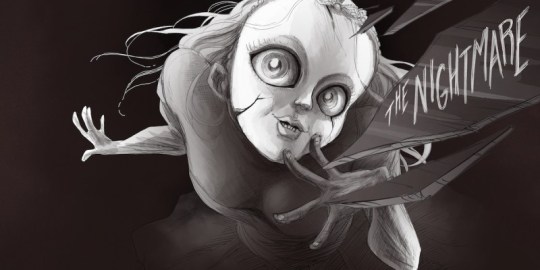
Why? Because that’s how the story goes.
So says the narrator.
So now that we've got that out of the way, let's talk about data.

Chapter I: Echoes and Shattered Mirrors
The problem with "data" is that we don't really think too much about it anymore. Or, at least, we think about it in the same abstract way we think about "a billion people." It's gotten so big, so seemingly impersonal that it's easy to forget that contemporary concept of "data" in the west is a phenomenon only a couple centuries old [1].
This modern conception of the word describes the ways that we translate the world into words and numbers that can then be categorized and analyzed. As such, data has a lot of practical uses, whether that be putting a rover on mars or tracking the outbreak of a viral contagion. However, this functionality makes it all too easy to overlook the fact that data itself is not neutral. It is gathered by people, sorted into categories designed by people, and interpreted by people. At every step, there are people involved, such that contemporary technology is embedded with systemic injustices, and not always by accident.
The reproduction of systems of oppression are most obvious from the margins. In his 2019 article As If, Ramon Amaro describes the Aspire Mirror (2016): a speculative design project by by Joy Buolamwini that contended with the fact that the standard facial recognition algorithm library had been trained almost exclusively on white faces. The simplest solution was to artificially lighten darker skin-tones for the algorithm to recognize, which Amaro uses to illustrate the way that technology is developed with an assumption of whiteness [2].
This observation applies across other intersections as well, such as trans identity [3], which has been colloquially dubbed "The Misgendering Machine" [4] for its insistence on classifying people into a strict gender binary based only on physical appearance.

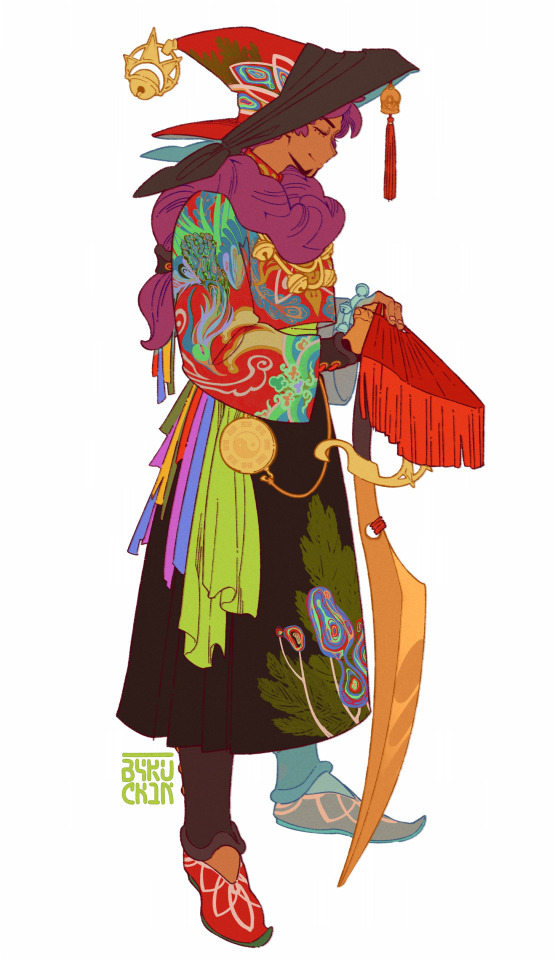
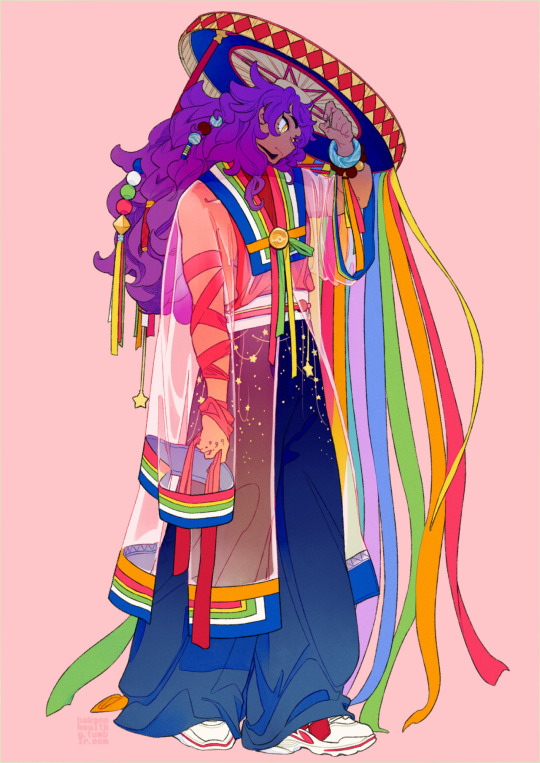
This has also popped up in my own research, brought to my attention by the artist @b4kuch1n who has spoken at length with me about the connection between their Vietnamese heritage and the clothing they design in their illustrative work [5]. They call out AI image generators for reinforcing colonialism by stripping art with significant personal and cultural meaning of their context and history, using them to produce a poor facsimile to sell to the highest bidder.
All this describes an iterative cycle which defines normalcy through a white, western lens, with a limited range of acceptable diversity. Within this cycle, AI feeds on data gathered under colonialist ideology, then producing an artifact that reinforces existing systemic bias. When this data is, in turn, once again fed to the machine, that bias becomes all the more severe, and the range of acceptability narrower [2, 6].

Luciana Parisi and Denise Ferreira da Silva touch on a similar point in their article Black Feminist Tools, Critique, and Techno-poethics but on a much broader scale. They call up the Greek myth of Prometheus, who was punished by the gods for his hubris for stealing fire to give to humanity. Parisi and Ferreira da Silva point to how this, and other parts of the “Western Cosmology” map to humanity’s relationship with technology [7].
However, while this story seems to celebrate the technological advancement of humanity, there are darker colonialist undertones. It frames the world in terms of the gods and man, the oppressor and the oppressed; but it provides no other way of being. So instead the story repeats itself, with so-called progress an inextricable part of these two classes of being. This doesn’t bode well for visions of the future, then–because surely, eventually, the oppressed will one day be the machines [7, 8].
It’s… depressing. But it’s only really true, if you assume that that’s the only way the story could go.
“Stories don't care who takes part in them. All that matters is that the story gets told, that the story repeats. Or, if you prefer to think of it like this: stories are a parasitical life form, warping lives in the service only of the story itself.” ― Terry Pratchett, Witches Abroad

Chapter II: The Invisible Narrator
So why does the narrator get to call the shots on how a story might go? Who even are they? What do they want? How much power do they actually have?
With the exception of first person writing, a lot of the time the narrator is invisible. This is different from an unreliable narrator. With an unreliable narrator, at some point the audience becomes aware of their presence in order for the story to function as intended. An invisible narrator is never meant to be seen.
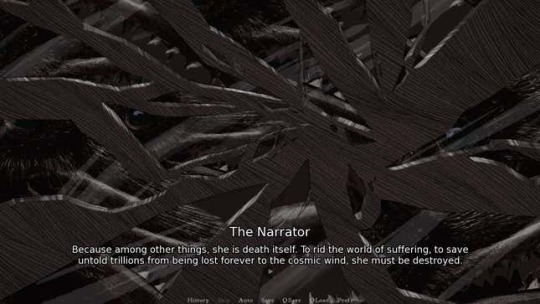
In Slay the Princess, the narrator would very much like to be invisible. Instead, he has been dragged out into the light, because you (and the inner voices you pick up along the way), are starting to argue with him. And he doesn’t like it.
Despite his claims that the princess will lie and cheat in order to escape, as the game progresses it’s clear that the narrator is every bit as manipulative–if not moreso, because he actually knows what’s going on. And, if the player tries to diverge from the path that he’s set before them, the correct path, then it rapidly becomes clear that he, at least to start, has the power to force that correct path.
While this is very much a narrative device, the act of calling attention to the narrator is important beyond that context.

The Hero’s Journey is the true monomyth, something to which all stories can be reduced. It doesn’t matter that the author, Joseph Campbell, was a raging misogynist whose framework flattened cultures and stories to fit a western lens [9, 10]. It was used in Star Wars, so clearly it’s a universal framework.
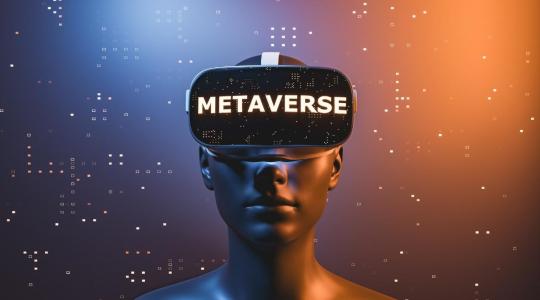


The metaverse will soon replace the real world and crypto is the future of currency! Never mind that the organizations pushing it are suspiciously pyramid shaped. Get on board or be left behind.
Generative AI is pushed as the next big thing. The harms it inflicts on creatives and the harmful stereotypes it perpetuates are just bugs in the system. Never mind that the evangelists for this technology speak over the concerns of marginalized people [5]. That’s a skill issue, you gotta keep up.
Computers will eventually, likely soon, advance so far as to replace humans altogether. The robot uprising is on the horizon [8].
Who perpetuates these stories? What do they have to gain?
Why is the only story for the future replications of unjust systems of power? Why must the hero always slay the monster?
Because so says the narrator. And so long as they are invisible, it is simple to assume that this is simply the way things are.

Chapter III: The End...?
This is the part where Slay the Princess starts feeling like a stretch, but I’ve already killed the horse so I might as well beat it until the end too.
Because what is the end result here?
According to the game… collapse. A recursive story whose biases narrow the scope of each iteration ultimately collapses in on itself. The princess becomes so sharp that she is nothing but blades to eviscerate you. The princess becomes so perfect a damsel that she is a caricature of the trope. The story whittles itself away to nothing. And then the cycle begins anew.
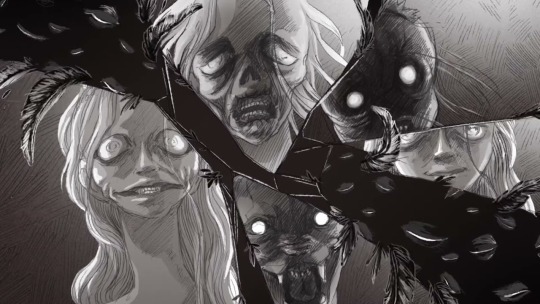
There’s no climactic final battle with the narrator. He created this box, set things in motion, but he is beyond the player’s reach to confront directly. The only way out is to become aware of the box itself, and the agenda of the narrator. It requires acknowledgement of the artificiality of the roles thrust upon you and the Princess, the false dichotomy of hero or villain.
Slay the Princess doesn’t actually provide an answer to what lies outside of the box, merely acknowledges it as a limit that can be overcome.
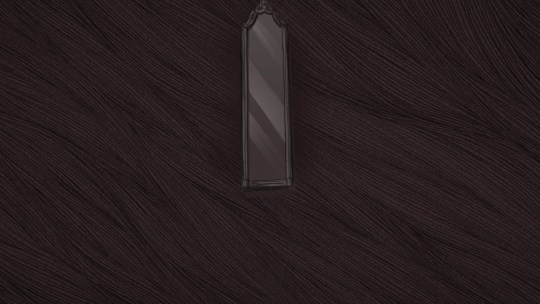
With regards to the less fanciful narratives that comprise our day-to-day lives, it’s difficult to see the boxes and dichotomies we’ve been forced into, let alone what might be beyond them. But if the limit placed is that there are no stories that can exist outside of capitalism, outside of colonialism, outside of rigid hierarchies and oppressive structures, then that limit can be broken [12].

Denouement: Doomed by the Narrative
Video games are an interesting artistic medium, due to their inherent interactivity. The commonly accepted mechanics of the medium, such as flavor text that provides in-game information and commentary, are an excellent example of an invisible narrator. Branching dialogue trees and multiple endings can help obscure this further, giving the player a sense of genuine agency… which provides an interesting opportunity to drag an invisible narrator into the light.
There are a number of games that have explored the power differential between the narrator and the player (The Stanley Parable, Little Misfortune, Undertale, Buddy.io, OneShot, etc…)
However, Slay the Princess works well here because it not only emphasizes the artificial limitations that the narrator sets on a story, but the way that these stories recursively loop in on themselves, reinforcing the fears and biases of previous iterations.
Critical data theory probably had nothing to do with the game’s development (Abby Howard if you're reading this, lmk). However, it works as a surprisingly cohesive framework for illustrating the ways that we can become ensnared by a narrative, and the importance of knowing who, exactly, is narrating the story. Although it is difficult or impossible to conceptualize what might exist beyond the artificial limits placed by even a well-intentioned narrator, calling attention to them and the box they’ve constructed is the first step in breaking out of this cycle.
“You can't go around building a better world for people. Only people can build a better world for people. Otherwise it's just a cage.” ― Terry Pratchett, Witches Abroad

Epilogue
If you've read this far, thank you for your time! This was an adaptation of my final presentation for a Critical Data Studies course. Truthfully, this course posed quite a challenge--I found the readings of philosophers such as Kant, Adorno, Foucault, etc... difficult to parse. More contemporary scholars were significantly more accessible. My only hope is that I haven't gravely misinterpreted the scholars and researchers whose work inspired this piece.
I honestly feel like this might have worked best as a video essay, but I don't know how to do those, and don't have the time to learn or the money to outsource.
Slay the Princess is available for purchase now on Steam.
Screencaps from ManBadassHero Let's Plays: [Part 1] [Part 2] [Part 3] [Part 4] [Part 5] [Part 6]
Post Dividers by @cafekitsune
Citations:
Rosenberg, D. (2018). Data as word. Historical Studies in the Natural Sciences, 48(5), 557-567.
Amaro, Ramon. (2019). As If. e-flux Architecture. Becoming Digital. https://www.e-flux.com/architecture/becoming-digital/248073/as-if/
What Ethical AI Really Means by PhilosophyTube
Keyes, O. (2018). The misgendering machines: Trans/HCI implications of automatic gender recognition. Proceedings of the ACM on human-computer interaction, 2(CSCW), 1-22.
Allred, A.M., Aragon, C. (2023). Art in the Machine: Value Misalignment and AI “Art”. In: Luo, Y. (eds) Cooperative Design, Visualization, and Engineering. CDVE 2023. Lecture Notes in Computer Science, vol 14166. Springer, Cham. https://doi.org/10.1007/978-3-031-43815-8_4
Amaro, R. (2019). Artificial Intelligence: warped, colorful forms and their unclear geometries.
Parisisi, L., Ferreira da Silva, D. Black Feminist Tools, Critique, and Techno-poethics. e-flux. Issue #123. https://www.e-flux.com/journal/123/436929/black-feminist-tools-critique-and-techno-poethics/
AI - Our Shiny New Robot King | Sophie from Mars by Sophie From Mars
Joseph Campbell and the Myth of the Monomyth | Part 1 by Maggie Mae Fish
Joseph Campbell and the N@zis | Part 2 by Maggie Mae Fish
How Barbie Cis-ified the Matrix by Jessie Gender
#slay the princess#stp spoilers#stp#stp princess#abby howard#black tabby games#academics#critical data studies#computer science#technology#hci#my academics#my writing#long post
241 notes
·
View notes
Text
Why is Help Wanted 2 Sun… Like That?
Okay, I’ve been putting off making this post until I felt like I had a better idea of what was going on, and now that I’ve watched at least part of a play-through and gone over the lines a whole bunch, I think I’m ready.
I’m gonna talk about my thoughts on Sun as a character as well as HW2 as a whole here, so it’ll be a bit long. Pop some popcorn or something.
Please keep in mind that this is all my personal opinion and you’re free to disagree with it! In fact, if you think I’m totally wrong, please tell me why. I love new perspectives!
SO! Let’s get right into it, shall we?
First things first: Help Wanted 2 Sun is not the same guy as Security Breach/Ruin Sun. If his personality difference was significant enough to surprise you, that’s because he’s a different person.
I’m not entirely sure how much of Help Wanted 2 is meant to be actually happening, but I think that at least the mini games are training simulations.
However, it’s important to note that a lot of the stuff happening in the mini games is just… nonsense. How did Freddy get frozen like that? What’s with those regular batteries in his arms? Why are half the supplies in first aid explicitly for robots and not humans? Why is there a shredder table in the daycare for kids to stick fingers into?
Some of this can be shrugged off with the usual “FazCo is meant to be comedically shitty and the tech often doesn’t make sense anyway,” but the first aid simulation is what really stood out to me. Even with the previous explanations, that doesn’t explain the calming gas mask that could only ever fit Helpy or the steel wool scrubber or the tank cleaner spray bottle among the medical supplies. If the goal is to train new first aid staff to avoid lawsuits, it’s doing a pretty poor job of it. So… what is it for?
I touched on this idea previously with my post about Sun’s AI being trained on kids’ artwork. The idea of FazCo making a silly new employee training game as a means of harvesting behavioral data to train their AIs seems very within their realm of scummy.
This is why the Arts & Crafts mini game exists. It’s literally a task that requires exact copying. Maybe it’s essentially like teaching an AI to solve captchas by feeding it a bunch of data on how humans solve them correctly and incorrectly.
Maybe its presence is explained to employees as fun practice with the VR system or a break activity during training or something.
This would explain several things about the game.
The existence of the shredder table and Sun shredding literally ALL of your artwork: It being a funny way to despawn the stuff you make is a lot more reasonable when that’s exactly what it’s for in-universe, too. The generators in the play structures are unsafe enough, but that would’ve been on another level if it were real.
Sun’s line “Be creative on your own time, we are making ART!” It literally isn’t a creative activity, it’s a task. I know you can’t really apply logic to a lot of FNAF stuff, especially the DCA’s design, but if Sun were actually this detail-oriented and perfectionistic with everything, he’d never be able to function in childcare.
The fact that Sun’s “fear” of the dark seems like a bit. It literally is a bit. There’s no threat, it’s not real. I originally thought he just wanted the player out of his space faster and didn’t know how to assert a boundary there, but I think it’s actually just to make the player finish the tasks faster for data collection purposes.
Possibly also why he’s so comfortable being casually rude to the player. He is a jester, after all, and the player has lots of opportunities to do things they shouldn’t, too. It’s basically all a bit.
Also… what if the minigames have versions of the base AIs in there? It’s a version of the Sun AI with the theater programming and the basics of the childcare stuff? His entire existence is a shitty little simulation where he runs a singular activity for grown adults who can’t (or won’t) follow very simple instructions.
The biggest thing that’s been bothering me about the takes I’ve seen regarding HW2 Sun’s personality is that people have been calling him “mean” while completely ignoring the circumstances he’s reacting to. If a coworker came into my personal space and I was so generous as to share my favorite activity with them and they proceeded to intentionally ignore the rules I set and EAT SUPPLIES I USE FOR WORK? Yeah, no, I’d react like that too.
There’s definitely something interesting about how genuinely excited and happy Sun sounds when first welcoming his new friend the player to the daycare and inviting them to Arts & Crafts vs. when they return. He seems like he WANTS to befriend the player, but the game just assumes you’ll be upsetting him so there’s no option for dialogue where you’re nice to him and respect his boundaries and participate in an activity with him in a way he’s comfortable with.
I say “in a way he’s comfortable with” because he is a little weird about the whole “sit right there and DON’T MOVE” thing. He does seem actually excited and enthusiastic about the idea of shooting darts at the items you want so he can get them for you, though. Maybe because he sees it as a happy compromise, or maybe because it’s supposed to be a fun part of the game he’s programmed to be in charge of.
I saw some other commentary on Sun (primarily thinking of @kazzykatt) talking about how he seems almost excessively self-sufficient, and how this could possibly be due to neglect (he and Moon definitely aren’t as well cared for as the other animatronics, the generators in the daycare are a very lazy fix for actually reprogramming Moon properly, he seems bitter that he can’t fix the carousel on his own and he and Moon don’t seem to trust the player to fix it, their design is clearly better suited to the stage but didn’t get changed for the daycare, I could go on and on), and this would also explain his control issues to an extent.
Sun, in SB and HW2, doesn’t leave the daycare. He has so little that he’s in control of in his own life. He used to be on stage (and based on his dialogue probably misses it quite a lot) but had the job he was built for taken from him. He’s a perfectionist that’s constantly overwhelmed by too many things being marked top priority in his system, working too many hours with too many small children. Of course he’d be desperate to hold onto any little bit of control he has.
Honestly, when I first heard his voice lines, the initial vibe I got wasn’t “wow they made Sun mean” but “wow Sun sounds actually miserable” and I’m kind of surprised more people didn’t pick up on that. He sounds less bitchy and more like he’s lashing out because he’s trapped in an awful situation that’s completely out of his hands.
“Wait, are you saying none of HW2’s characterization should be taken seriously?”
You might be asking that, but my answer is a resounding NO! This is definitely still a Sun, and I think seeing two different Suns (even if we don’t know how much of HW2’s personality we can assume is meant to be taken seriously) is really helpful for interpreting what the base Sun personality might have.
It’s also important to keep in mind that none of the Suns we’ve seen were in a good situation. Security Breach Sun had the virus, Ruin Sun had gone slightly mad from isolation, and HW2 Sun is stuck in a shitty simulation babysitting bored adult staff as they fail to complete simple tasks. What we mostly know about him is how he responds to stress, and this is why there’s so much room for interpretation!
Here’s some traits I think every version of the Sun AI would have.
Love of making things. Despite everything, HW2 Sun seems to genuinely love doing arts & crafts. Especially with googly eyes. This could kind of be assumed from SB Sun, but he was also trying to entertain/bribe a child.
On this note… interest in fixing things? Maybe he just wants to avoid having to rely on staff, but if he and Moon are subject to that much neglect, it makes sense that he’d try to learn to do repairs himself. I saw @pixelchills talking about the possibility that the S.T.A.F.F. Bots in the DCA’s room are not there because Moon broke them, but because Moon collected them for Sun to practice fixing. It seems feasible to me, especially since taking something apart and putting it back together might have the same calming and satisfying effect on Sun as completing something like a paint-by-numbers.
Playful insults and lots of drama. I don’t mean actual rudeness, I mean friendly teasing. Again, he is a jester. A lot of his HW2 insults come across more like this. Hell, even his compliments come across like this with the delivery and immediate shredding. He’s just a theater kid at heart.
Difficulty regulating emotions under pressure. This is the kind of thing that would pop up on his worst days (such as being trapped in his destroyed home with a poor connection to his badly damaged physical form while the only help he’s seen in ages ignores his instructions and puts their own safety at risk, or being trapped in a shitty simulation while his only company ignores his instructions and puts their own safety at risk). He’d have to be able to manage this sort of thing better to work well with children, but everyone’s got their bad days. He’s prone to outbursts and tantrums when he’s overwhelmed and unable to stop people from breaking the rules and/or hurting themselves.
People pleasing and nonconfrontational. Yes, HW2 Sun, too. SB Sun seems genuinely desperate to make sure Gregory’s having a good time, and HW2 Sun is shockingly tolerant of some of the player’s bullshit (ex. how he tries to laugh off them shooting darts at him/throwing things). Even calling the player “good friend” when he’s not so happy to see them or threatening them with Moon instead of just telling them their time is almost up seem like signs of this to me. And letting the player make arts and crafts in the ruined daycare in HW2? Yeah, that’s a people pleaser through and through. Sun needs a lesson in setting boundaries (and for those boundaries to actually be respected).
Perfectionistic + “if you want something done right, you’ve gotta do it yourself” attitude. This would mostly manifest in how he completes work tasks, but I think every Sun’s incredibly detail-oriented and would rather do everything themselves just to make sure it’s exactly how they want. This could manifest in lots of ways, from “insulting the staff for how they put things away and telling them to do it again while he supervises” to “politely thanking them for their help and complimenting their hard work only to redo everything himself the moment they’re gone.” I think where on that spectrum you wind up is dependent on the version of Sun you’re interacting with and the environment his personality developed in.
High-energy and social! A given, of course. He never stops moving and everything is always so exciting. New people are friends he hasn’t met yet until proven otherwise.
Love of pranks… to an extent. Again, jester! I stand by my headcanon of Sun and Moon conspiring to convince the staff Moon’s some sort of spooky monster whenever he’s not actively dangerous. As long as he’s not making a mess, breaking the rules, throwing himself off-schedule, or actually hurting anyone? He’s all over it.
Anxiety. This seems like it’s at least partially caused by the lazy daycare reprogramming. All the Suns we’ve encountered seem to lack knowledge of how to actually get children to behave. It seems more like they programmed him with a bunch of games and activities and then set a bunch of super high-priority tasks for him such as “keep kids safe, keep kids happy, keep kids entertained, keep daycare clean” etc. and he’s unable to really prioritize so he’s just constantly overwhelmed.
Kinda always using “childcare voice.” If you know anyone who’s worked with kids, you know what I mean here. Even with adults, he talks to them like kids sometimes, just because it’s what he knows and what he’s used to and because his processor’s fried from however many hours a week he’s surrounded by kids. Consider his reactions to when you eat the crafts as an example. (IMPORTANT NOTE: I don’t think he’d coddle adults like children. It’s more about tone and vocabulary, like “customer service voice”.)
Stickler for rules. He cares about things being done right! The rules are there for a reason! Order is important to him (probably in no small part because it keeps him out of trouble and reduces his stress).
That’s about all I can think of for now, but as someone who writes a very friendly and sweet Sun, I actually don’t think HW2’s characterization was that far off from what I had already assumed based on Ruin/SB. The only difference is that the Sun I’m usually writing is in a much more supportive environment with lots of helpful staff that care about his well-being. If he didn’t have that, I could absolutely see him becoming more like HW2.
I will finish this off with two final important points:
Being an emotional person and liking “childish” things does not make an adult less of an adult.
(He’s a childcare worker, c’mon.)
If someone gets pissed off after being repeatedly antagonized, that does not make them a “mean/bitchy/sassy person.”
(Yeah, he doesn’t handle it gracefully, but to be fair, I wouldn’t either in his shoes.)
Thank you all for reading!!
#fnaf sun#fnaf#fnaf help wanted 2 spoilers#fnaf hw2#fnaf help wanted 2#fnaf headcanons#fnaf hcs#hw2 sun#hw2 spoilers#dca sun#sun fnaf#fnaf dca#dca fandom#daycare attendant sun
340 notes
·
View notes
Text
MYKOLAIV, UKRAINE—Kateryna Nahorna is getting ready to find trouble.
Part of an all-female team of dog handlers, the 22-year-old is training Ukraine’s technical survey dogs—Belgian Malinois that have learned to sniff out explosives.
The job is huge. Ukraine is now estimated to be the most heavily mined country on Earth. Deminers must survey every area that saw sustained fighting for unexploded mines, missiles, artillery shells, bombs, and a host of other ordnance—almost 25 percent of the country, according to government estimates.
The dogs can cover 1,500 square meters a day. In contrast, human deminers cover 10 square meters a day on average—by quickly narrowing down the areas that manual deminers will need to tackle, the dogs save valuable time.
“This job allows me to be a warrior for my country … but without having to kill anyone,” said Nahorna. “Our men protect us at war, and we do this to protect them at home.”
A highly practical reason drove the women’s recruitment. The specialized dog training was done in Cambodia, by the nonprofit Apopo, and military-aged men are currently not allowed to leave Ukraine.
War has shaken up gender dynamics in the Ukrainian economy, with women taking up jobs traditionally held by men, such as driving trucks or welding. Now, as mobilization ramps up once more, women are becoming increasingly important in roles that are critical for national security.
In Mykolaiv, in the industrial east, Nahorna and her dogs will soon take on one of the biggest targets of Russia’s military strategy when they start to demine the country’s energy infrastructure. Here, women have been stepping in to work in large numbers in steel mills, factories, and railways serving the front line.
It’s a big shift for Ukraine. Before the war, only 48 percent of women over age 15 took part in the workforce — one of the lowest rates in Europe. War has made collecting data on the gender composition of the workforce impossible, but today, 50,000 women serve in the Ukrainian army, compared to 30,000 before the war.
The catalyst came in 2017, years before the current war began. As conflict escalated with Russia in Crimea, the Ukrainian government overturned a Soviet-era law that had previously banned women from 450 occupations.
But obstacles still remain; for example, women are not allowed jobs the government deems too physically demanding. These barriers continue to be chipped away—most recently, women have been cleared to work in underground mines, something they were prevented from doing before.
Viktoriia Avramchuk never thought she would follow her father and husband into the coal mines for DTEK, Ukraine’s largest private energy company.
Her lifelong fear of elevators was a big factor—but there was also the fact that it was illegal for women to work underground.
Her previous job working as a nanny in a local kindergarten disappeared overnight when schools were forced to close at the beginning of the war. After a year of being unemployed, she found that she had few other options.
“I would never have taken the job if I could have afforded not to,” Avramchuk said from her home in Pokrovsk. “But I also wanted to do something to help secure victory, and this was needed.”
The demining work that Nahorna does is urgent in part because more than 55 percent of the country is farmed.
Often called “the breadbasket of Europe,” Ukraine is one of the world’s top exporters of grain. The U.K.-based Tony Blair Institute for Global Change, which has been advising the Ukrainian government on demining technology, estimates that landmines have resulted in annual GDP losses of $11 billion.
“Farmers feel the pressure to plow, which is dangerous,” said Jon Cunliffe, the Ukraine country director of Mines Advisory Group (MAG), a British nonprofit. “So we need to do as much surveying as possible to reduce the size of the possible contamination.”
The dogs can quickly clear an area of heavy vegetation, which greatly speeds up the process of releasing noncontaminated lands back to farmers. If the area is found to be unsafe, human deminers step in to clear the field manually.
“I’m not brave enough to be on the front line,” 29-year-old Iryna Manzevyta said as she slowly and diligently hovered a metal detector over a patch of farmland. “But I had to do something to help, and this seemed like a good alternative to make a difference.”
Groups like MAG are increasingly targeting women. With skilled male deminers regularly being picked up by military recruiters, recruiting women reduces the chances that expensive and time-consuming training will be invested in people who could be drafted to the front line at a moment’s notice. The demining work is expected to take decades, and women, unlike men, cannot be conscripted in Ukraine.
This urgency to recruit women is accelerating a gender shift already underway in the demining sector. Organizations like MAG have looked to recruit women as a way to empower them in local communities. Demining was once a heavily male-dominated sector, but women now make up 30 percent of workers in Vietnam and Colombia, around 40 percent in Cambodia, and more than 50 percent in Myanmar.
In Ukraine, the idea is to make demining an enterprise with “very little expat footprint,” and Cunliffe said that will only be possible by recruiting more women.
“We should not be here in 10 years. Not like in Iraq or South Sudan, where we have been for 30 years, or Vietnam, or Laos,” Cunliffe said. “It’s common sense that we bring in as many women as we can to do that. In five to 10 years, a lot of these women are going to end up being technical field managers, the jobs that are currently being done by old former British military guys, and it will change the face of demining worldwide because they can take those skills across the world.”
Manzevyta is one of the many women whose new job has turned her family dynamics on their head. She has handed over her previous life, running a small online beauty retail site, to her husband, who—though he gripes—stays at home while she is out demining.
“Life is completely different now,” she said, giggling. “I had to teach him how to use the washing machine, which settings to use, everything around the house because I’m mostly absent now.”
More seriously, Manzevyta said that the war has likely changed many women’s career trajectories.
“I can’t imagine people who have done work like this going back and working as florists once the war is over,” she laughed.
57 notes
·
View notes
Text
file 002 — brand new bar, same old problems

chapter two of death defying acts
previous chapter | masterlist | next chapter
cw: MDNI thank you, fem!reader, afab!reader, no descriptions of reader (i'm really trying to keep my descriptions of her and her background to a minimum so i can be inclusive to all people, but let me know if i can improve), no use of y/n, reader has a call sign (i had to pick one, it makes sense for the story), innacuracies about the navy, topgun and army (i did my best guys), this takes places after the events of the movie, yes don't kill me but reader has a fling with another aviator won't say who, implied smut.

If surviving Captain Pete ‘Maverick’ Mitchell and the Dagger Squad would be required for you to be sent overseas, you were not sure there was gonna be a lot of you left to fit in a plane seat.
In just two days and one quick chat with Maverick, you had to recognize there was no easy task in front of you. Maverick didn’t show any enthusiasm in your work or questions on that quick meeting, which was somewhat discouraging. You had been spending your morning reviewing previous logs of all of the fighter pilots, your afternoons watching them live on radar, taking notes of their data, style and skills, your evenings analyzing all of your notes and coming up with plans for the simulation.
You were in bed way past your normal schedule on Saturday morning. Your belongings would definitely sit on boxes for another week or two if you didn’t do anything regarding it. You had the essentials out — uniforms, underwear, laptop, hygiene products, and a picture of you with your parents —, but that was it. Even your kitchen was getting appliances as you started to need them.
You grabbed a clean change of clothes, your bag and headed out to do groceries and get your mind out of work. There were a lot of things to get done before you were back to base on Monday: firstly you needed some real food in your fridge, including new tea blends and pasta for when you’re too tired to cook anything that takes longer than 20 minutes. Then you had to pick up more pills for your headache. Maybe some flowers for your living room would make the place livable — and also push you to unpack a few boxes with your books and portraits.
Also you had to call your parents and brief them on your first days. Well, maybe that was easier said than done: while you couldn’t share much details about what you were doing, you knew they were ready to pull some interrogation tactics or whatever to get all the intel. Your father was the one helping you with the moving — because he was free in between flight classes —, but your mom was the one texting people to know why now they wanted to transfer you to San Diego.
Once the call sign Maverick was brought to the table, your father did all he could to get you another opening somewhere else. And as soon as you got the bigger picture of why you were being moved to work with Maverick and his team, the puzzle made sense. Even though they were successful on their mission, they had one more challenge ahead, and there was no margin for errors or close calls for this one — you were gonna receive more information about it after the first few weeks.
Maverick and the Dagger Squad were definitely a lot to deal with. Excellent pilots, an amazing sense of a team — maybe almost being killed does this to a group —, but you could see some flaws slipping through the cracks of their personalities. Maverick still hated authority and being told to follow orders. Jake ‘Hangman’ Seresin — not Bagman, unfortunately — could be a team player only if that benefited him, otherwise his wingman was the first to go down during training. Natasha ‘Phoenix’ Trace was an excellent pilot, and Robert ‘Bob’ Floyd as her WSO was a great combo, but if paired with someone else, it was a hit or miss — you asked to change pairings on Friday morning, just to check if there was margin for new combos. Reuben ‘Payback’ Fitch and his WSO, Mickey ‘Fanboy’ Garcia, were also a great combo, but they needed a strong flight leader to shine and succeed. Javy ‘Coyote’ Machado was a good pilot, but only on good days — and that was something you couldn’t risk on a mission. And Bradshaw was living for his call sign Rooster, even though he had amazing decision making skills, he was always waiting for the last second to make a move. And that, in the field, meant death.
And those were just a few observations you could get from a few hours in front of the radars and live data from their training exercises.
You went through your shopping list in no time, stopping for headache meds and some flowers just after you got lunch. Back at your one bedroom apartment, you, once again, found an excuse to avoid a Facetime call with your parents, but you made sure to text them some pictures of your progress — and thank your dad for finding a good place for you to stay, a 20 minutes drive from the base, and also in a walking distance of the Golden Hill Park.
Clothes on drawers and hangers, cutlery in the right places, uniforms in the washer, books in the shelves. You were slowly bringing together the sense of home to San Diego. Your last few weeks in Nevada were crazy: you were back from one deployment in the Pacific just to be called for another quick job in Alaska. Thankfully your dad had a few weeks off to go to Nevada and help you pack, driving all your stuff three days before your arrival and saying he would take care of housing. All you had to do was sign a few papers, pack the stuff you could send ahead and get ready for a quick stop up north.
The sun was setting when you realized you were almost done with things. Maybe you should let some for Sunday, so you could also keep your mind off of work. You got up from your bedroom floor, took a long shower and checked your messages.
On Friday, you were able to catch up with Bob over lunch, asking him about his journey after training. You also got close to Phoenix, kinda relieved she was just as nice as you remembered. You got their numbers, they got yours, and that’s how you end up with an invite to join them at a bar called Hard Deck in an hour. If you were gonna be around for at least ten weeks, you might as well do something else besides working.
So you went through your clothes, searching for a black top, some jeans and a jacket for when it got chiller from the autumn air. Just some casual clothes to share a few beers and a few more stories. Still getting used to San Diego streets and skyline, you drove like you weren’t in no rush to get to the bar, appreciating the change of scenery from the desert to the beachside.
You parked outside the Hard Deck just a few minutes late. For a Saturday evening, the place was pretty packed, and you could see some clients were proud to walk around in their work khakis — something you avoided as much as you could. After all, you were just a few minutes away from the station. Texting Bob back to ask him if they were already there, you didn’t even hit send before you were able to pick your new colleagues amidst the crowd.
Nat was holding a pool cue on the side of her body, explaining something to Mickey and Bob. Hangman and Coyote were trying to impress some ladies on the darts board — and you were very sorry for those two poor souls, if they knew everything you’ve been hearing while on duty. You stopped by the bar, getting yourself some bar soda and starting a tab.
“You’re sure I can’t fix you anything else?” The lady behind the bar asked you.
“I’m good for now.” And then you turned to your colleagues and thought better, “Do you happen to remember what they’re getting?” You pointed to them.
“Sure thing, they’re just having beers. Are you friends with the Daggers?”
“Not exactly,” you watched her grab six bottles, serve some ice in the bucket and hand it to you. “I was relocated here to work with them. I know Bob and Phoenix from previous training, but that’s about it.”
“Oh, so you’re part of Maverick’s team?” She definitely knew them, not just because they would be spending their down time on Hard Deck.
“I’m part of the Intelligence Team working with them.” It didn’t get easier every time you talked about it. “I’m sorry, I didn’t catch your name.”
“It’s Penny, honey. Well, let me know once you decide to try something else.”
“Thank you, Penny.”
You took the drinks with you to the high top table just on the side of their pool table. Your upbeat spirit died down as soon as you realized Bradshaw was there. After being lectured about Maverick and Goose, Bradley’s father, you weren’t looking forward to tolerating him outside of work. His short temper and slow decision making was something that got on your nerves easily. But you should’ve expected this, since he’s a long time friend with Nat.
“Look who’s out of that desk, guys.” And unfortunately, Hangman was the one to announce your presence. “I thought you were the type to wear your uniform everywhere since you’re a goody-two-shoes, Hyde.”
“Unlike you, Seresin, I have a life and personality outside of base.” You pointed to his khakis. “And don’t worry, I’m not writing down your lack of hobbies, outside women and pissing others off of course. I could already tell that based on your flight maneuvers.”
“Looking forward to reading the file you’re writing about me.” He reached for a beer, and you rolled your eyes. “Thanks, honey.”
“I’ll be surprised if you can actually read,” you bit back. “But I’m not here to work. And these beers are a peace offering. I’m not the enemy.”
“So you just like to point out our weaknesses for fun.” Mickey approached you, but you could tell it was more of a lighthearted comment than a critique. “Thanks, Hyde.”
“Thank me next week when you ace the mission simulation.”
You passed them their beers. There was only one left, but since Bradley was more concerned with his pool game than a beer, you moved the bucket aside and turned to Bob, asking “Is this every Navy favorite place to go?”
“Kinda. It’s close to base, and the service is nice and fairly priced.” Bob looked at his water. “How long have you been here?”
“I arrived this week. My father helped me move, but I had zero time to wander around.” But who’s fault was that? Definitely yours. “They are a tough crowd, I fear.”
“Don’t worry, they eventually warm up to strangers,” he explained. “We’re still fresh from last mission, and fresh blood always disturbs a little of a group’s balance.”
“I guess I would know that if I worked closely with fighter pilots,” you confessed. “Most of my missions consist of assisting with data and probabilities when tracing plans and assessing risks. Sometimes I don’t even know who is receiving my reports.”
“But you’ve been training with pilots, right?”
“No real missions, just simulations, mostly with graduates from Top Gun back in Fallon.” This job could be the perfect blend of what you’re good at and your passion, but even though you had extensive training with Air missions, you were stuck with assessing risks for admirals and captains to take charge. “It’s my first real chance to be on a mission where I’m able to build a relationship with the people I’m working with, not just being briefed on the mission and its goals.”
“I see. Yeah, I believe you’re gonna do a great job, not just because I know you, but because there’s still room for improvement and you’re gonna be the key for it.” Bob tried to cheer you up, and even though you wanted to believe his words, the first few days were tough on you.
“Thanks, Bob. But I’ve meant it when I said I’m not here to work,” you laughed, leaving the pressure of your relocation for another time.
“So you better start sharpening your pool skills, Hyde.” Natasha passed you her pool cue and smiled. “Do you even play it?”
“Who do you think I am, Phoenix?” You gasped, as if her words were the biggest betrayal you ever faced. “It’s been a minute since I last played, tho.”
“It’s ok, you don’t need to be good at everything you do, you know.” She joked. “Ok, cutthroat rules. You, me and Rooster.”
She reseted the table as she explained how it was going to work: she was protecting balls 1 to 5, you were in charge with 6 to 10, Rooster had 11 to 15 to himself. The goal was to pocket any opponent's balls while protecting yours. If a foul occurred, the other players had the right to place a ball back at the table.
Natasha breaks, and one of hers was pocketed right away. On her shot, she aimed for the 7-ball, but it lacked strength to send your ball to the pocket. You took a look at the table, spotting a chance to pocket the 12-ball. You walked to the other side, passing just inches away from Bradshaw, and sending his ball to the pocket. He looked unimpressed when you checked for his reaction. You tried to get one of Nat ball’s, but you picked the wrong angle.
Bradshaw fixed his sunglasses on the neck of shirt, assessed the table and went for the 8-ball. Everyone was tied on losses. He sent the 1 straight to the pocket. His third shot scratched the 6-ball and moved it to a dangerous spot, and you held your breath.
“Don’t worry, I’m on your side,” Natasha aimed for the 15-ball and sent it straight to the corner pocket. But it was still a risky position for your 6-ball, and you watched when she pocketed that one as well. “I mean, I took one of his first, which makes us even, right?”
“That’s not what I’ve learned on Math 101, but ok.” You shook your head. “What are you gonna do next?”
“I’m gonna,” she elongated her words, “maybe this one,” she pointed to the 5-ball, “or a small challenge with the 14.” She positioned herself, and missed the latter for a lot. “Your shot, Hyde.”
You sent the 14-ball straight into the pocket, then missed your shot. Bradley took the 3-ball out, followed by the 10, and missed the 7. Nat got the 9-ball, then missed. You tunnel vision on the 13, in the middle of the table, with a huge chance of error. The white ball hit all the wrong corners and you miss it. And it got the white one on the perfect spot to send your last ball to the pocket.
“It was nice playing with you, fellas.” You turned over your cue and crossed your arms, destiny sealed since Bradshaw was a way better player than you. You watched the 7-ball disappear inside the pocket.
“Wait, Hyde, someone could get a foul, and you can come back,” Nat tried to pull you back to the table.
“I’m good with my loss, don’t worry. I’m not leaving, just wanna get something from the bar.” You took the now empty bucket — did Bradshaw get his beer or someone stole it? — to the bar and returned it to Penny.
“How is it going?” She smiled and motioned her head to the group.
“Could be worse. Can I have a tequila shot?”
“Sure, honey.” Penny checked something under the bar. “Is house tequila ok?”
“Yeah, it’s fine. Can you get me one water and two more beers as well?”
“Coming right up.”
You took your phone of your pocket, and checked your messages: you were setting the family group chat aside for tomorrow morning; Lisa, your roommate from Fallon, was sharing updates on the gossip you were missing — not even three days and they didn’t failed to surprise you — while in San Diego; Ashton, still unaware of your transference, was asking if you were free. Yeah, things would never change.
“Here.” She laid your order on the counter. “I know you’re an Officer, but do you happen to have a call sign?”
“It’s more common to hear people calling me by it than my own name,” you shared, and she laughed. “It’s Hyde, a character from a gothic novel.”
“Oh, I believe I’ve read this book in high school.” She pressed her lips together and stared at you, like she was trying to put the pieces together. “Do you need some lime and salt for the shot?”
“No, not really.” Maybe not a smart idea since you’re driving, but that was the Hyde in you: nice face, good manners, but short tempered and always down to some trouble. “Thanks, Penny.”
You balanced your shot and the water in one hand, held the two beers in the other and moved carefully between the crowd to your friends. Back to the pool table, you watched Rooster send Nat’s last ball to the pocket.
“Oh no! And I thought you were each other's lucky charm,” you pointed out between her and Bob. You sat by her WSO’s side and passed him a water. “Or do you want a beer?”
“Water’s fine, thanks,” he offered you some nuts, and you gladly took a few.
“Here, a consolation prize for you.” You slid a beer for Nat as soon as she joined the table. You looked over her shoulder, seeing Bradshaw walking to the piano. “Is he always like that?”
You looked over your shoulder to Bradshaw. He carried a lot of resemblances to his parents — you could tell after hours looking through your parents’ photos, and seeing Goose and Carole in a few, with a kid Bradley closer. This was way before you were transferred to San Diego or decided to join the Navy.
You thought Bradshaw was just like you, until your father told you what happened to him. Father died after a failed ejection, his mom died of cancer, Maverick pulled his papers and set him back. You felt sorry about it, but if he was raised by Pete Mitchell after all of that, you were expecting to meet the younger version of the captain.
“Give him some time, Rooster is not much of a fan of changes,” she explained.
“As long as this doesn’t interfere with my job, I’m ok with not being friends with everyone.” You drank the tequila shot without making an ugly face, and quickly moved to your beer.
“Do you happen to know anything about our next mission?” Nat asked.
“I’m afraid I’m just as in the dark as you,” you shook your shoulders. “I know about the uranium mission though, which was pretty dangerous. I would’ve done a thing or two differently.”
“What exactly?”
“I mean, they could’ve timed the missiles to hit a few SAMs as you were leaving the valley, and make your way out of there smoother.” They were already flying a dangerous zone on less powerful planes, and exposed the hell of their jets, so not having at least a few bombs to help out was a little dumb.
“You’re kinda right,” Bob threw another nut inside his mouth. “Do you think they considered it?”
“Nah, I bet 20 bucks Admiral Simpson was looking for an opportunity to get rid of Maverick.” You took a sip of your beer.
“That’s cruel. But hey, if you have the chance to make our mission less dangerous, you have my approval.” Nat smiled.
“I’ll remember that.”
“Hey, have you always been part of Intelligence?”
You and Bob shared a look. “No, I joined the Navy after graduating from college. My parents are from the Navy, and they gave me the chance to choose. So education, then enlisting. My records say I graduated from Flight School because I completed the training successfully, but I got in an accident during the last week. Then, because of my college degree, they gave me a spot as part of the Intelligence, and I liked it there.”
“Oh, I’m sorry for your accident. I bet you miss being in the sky sometimes.”
“Thanks, Nat. My dad is a flight instructor nowadays, and everytime we’re in the same base, he finds a way to let me fly for a few minutes.”
“So you’ve been keeping your flight skills in check? Why don’t you apply to Top Gun?” Bob inquired.
“I really don’t see myself doing what you guys do on a daily basis,” another sip, waiting for them to be convinced. You were way past that Top Gun chance now, anyway.
“A pretty thing like you fits better as a Top Gun pilot's wife,” Hangman came up to the table, a beer in hand.
“I rather crawl naked over hot tarmac than date an aviator, Bagman.” Maybe if the aviator wasn’t part of your team, but just maybe. “You guys are just trouble. Can’t keep your missiles in your pants, and flee as soon as possible.”
“You’re funny, Hyde,” he pointed his beer’s neck at you.
“Don’t let it fool you, Hangman, they don’t call her Hyde for nothing,” Bob warned him.
“Don’t have a lot of Jekyll going on, hun?”
“Oh god, you’re insufferable,” Nat exited the table as fast as she could.
“No wonder those girls left you hanging on the darts,” it was kinda undeniable that there was some tension in the air.
“If you’d excuse me, I think it’s the perfect time to call my girlfriend.” And Bobby was smart to take his cue to leave you two alone. He motioned to his phone, and you noticed the picture on the wallpaper: the WSO with his arms around a beautiful girl. But she didn’t look like anyone you’ve seen around at base so far.
“Needs babysitting, Bob?” Hangman teased.
“Should I remind you who fell for the feral koalas story, Seresin?” Bob biting back? That was a first for you.
You looked between the two men, intrigued.
“Go talk about pandas or whatever, Floyd.” Jake waved his hand.
“See you later, Hyde.” Bob walks to the external deck, phone in his ear.
“What did he mean with feral koalas?” You inquired.
“His lady is Australian, and one time she told us about how koalas got a disease and were attacking people, and she sounded very scared.”
“And you believed it?”
“I mean, there was a lady in distress!”
“Jeez, we should legally change your call sign to Himbo.”
“Him-what?”
You laughed and stared at Jake, “I’m dead serious about not dating aviators, tho.”
“Who said anything about dating?”
One thing led to another. Coyote left the bar with a girl on his side, Hangman was left without a ride. You offered to drive him there, since it was on your way home, but you were none the wiser after a tough week and a few tequila shots.
When the sun started to peak over the waves, you were far away from Jake’s bed and still very much sure of your promise. You were in San Diego with one goal and one goal only: earn that promotion. And nothing or anyone was stepping into your way.

a/n: hello aviators! first of all, thank you SO MUCH for the support on the first chapter. yes, i wrote what i wrote and i don't regret it (hyde hooking up with hangman, but it was mostly implied so don't worry, it's almost like it didn't happened haha). also even tho we know who the daggers are, hyde is still getting to know them, i couldn't pass on a hard deck introduction scene (top gun: maverick movie style!). well, let me know what you guys think about this chapter, don't forget to reblog, vote and comment! see ya soon!
#bradley bradshaw#bradley rooster bradshaw#bradley bradshaw x reader#top gun maverick fanfic#top gun maverick series#bradley bradshaw fluff#bradley bradshaw fanfiction#bradley brawshaw x female!reader#bradley brawshaw x you#bradley brawshaw x y/n#bradley bradshaw imagine#top gun rooster#rooster x reader
44 notes
·
View notes
Text
I want to take a look at Percy de Rolo's skill set in the most mathematical but silliest way possible, by crunching the numbers of the over 2000 dice rolls made for this character over Campaign 1.
Sure we know he's a good shot and talented engineer, but what about everything else? Using the raw data compiled by CritRoleStats, separating out the natural values and types of results for Percy a few fun things came out. [some explanation under the cut]
Starting with the most rare skills used: Percy only made single rolls for Animal Handling and Performance. They had extremely different results. The Animal Handling roll was so bad he got bit by the wolf Galdric in Ep 45 (rolled a 7). The Performance was assisting Pike in bringing a boy back to life after the Kill Box fight in Ep 52 (rolled a 19).
The next set of skills only showed up a few times. Medicine and Sleight of Hand both 2 times, Nature and Survival both 4 times. Of these only his Sleight of Hand is dismal with and average roll of 7 with a Nat 1 in there. The other skills in this group are all pretty well off; Survival has an average of 13 and Medicine a 13.5. Hilariously "indoor kid" Percy's second highest averaged skill for the whole campaign is Nature with 16.5 reflecting both a Nat 20 and 19 roll.
Now we get in to skills that come around more often in the game. Arcana, Deception, Intimidation, and Religion. Each show up between 7 to 11 times and they are all either Intelligence or Charisma based skills. Intimidation averages to 12.67, Arcana to 12.25, Deception to 12, and Religion to 11.38. While all the averages for these are more clustered the swing between low and high rolls reveal more. Take Deception where of the roles nearly a third are 20s or 19s balanced by 2s and 3s. There's a lot more deep hit-or-miss in this set.
I'm going to split these more common skills into vs. matches. History vs. Persuasion and Acrobatics vs. Athletics. All 4 of these skills were rolled 19 to 25 times. History averaging at 12.28 and Persuasion at 12.5 match up fairly similarly in the value and spread of rolls. While Acrobatics, a Dexterity skill, and Athletics, a Strength skill, are similar the comparison is interesting. Percy's most notable base skill is has always been Dexterity with a score of 22, while Strength is his 'dump stat' at 12. However the natural rolls tell a very different story! Acrobatics averages at 11.63, there's 2 Nat 1s in there, and he rolls 6 or below more than 31% of the time. Where as Athletics averages pretty high at 14.2, he never rolls under a 6, and rolls 16 or better 40% of the time.
Finally we get to Percy's 3 most used skills in the game, +1 that should have been in the previous section but pairs better with a skill in this batch. Investigation, Perception, and Stealth which were collectively rolled over 300 times; and Insight only rolled 20 times but a core mechanic in Critical Role Campaigns to this day. Stealth is the most straight forward averaging in at 11.3 and with common enough advantage on Stealth in the party this is fairly expected value. Perception is the most used skill used for our guy at over 130 rolls it averages 10.84; while the 10 or lower rolls do out number the 11 or above, the Nat 20s more than compensate to bring it back just slightly above the statistical average. At last we get to Investigation and Insight, collectively rolled 100 times with known values. You would think Percy might have some of his natural dice luck here over that many rolls ... but no. The average for Investigation comes in at 9.48 and Insight at 8.53. Even with nearly the double the expected number of Nat 20s nothing could save him from rolling 10 or under 63% of the time.
The dice do tell a story.
It's just not always the one you expect.
Some explanation for clarity.
I used only the actual dice roll values for comparison sake. Including the modifiers skews things toward skills with training, I'm much more curious in the "natural" chance of a dice roll adding to a characters story. The expected value D20 rolls over time is 10.5 so skills that are rolled more often tend to average out near that number.
#critical role#percy de rolo#percival de rolo#percy de rolo skills series#vox machina#the legend of vox machina#I did the math#please come talk to me about what these stats tell you about Percy#some of these results are hilarious to me#particularly the athletics one#that is the ONLY strength skill in D&D#and yet the dice are like ... um actually ... Percy is super great at this
17 notes
·
View notes
Text
Navyman's Bane (Navy) VS Rico Black
(Full matchup list here)


Alright team, here's a recap: This is a contest to determine who amongst you will take the top of the leaderboards and be hired at TFI! Simply put, whoever gets the most votes gets to move on, and whoever doesn't... Well. They'll be put down swiftly and cleanly. :}
So, mann your stations, because here are your next contestants! Vote for your favorite mercenary who you want to win the TF2 OC Contest! - P
OC INFO UNDER THE CUT!
We highly encourage you to take a peek to make your decision!

Navyman's Bane (Navy)
@scoutbot
Image credit: @/scoutbot
navyman's bane is a magic sword puppeting a human corpse. they were forged during the golden age of piracy and immediately after enchanted by a wizard, granting them incredible magic power and sapience. though they were content to be wielded by humans for the first part of their existence, after getting stuck on a sinking ship, staying there for 200ish years diminishing their power by pushing away the sea, and then getting recovered and put in a museum that opinion rapidly changed.
being a demoknight for RED is the closest thing navy could find to the life they were used to in tf2's modern day. theyre certainly having fun, but sometimes they do mourn for the life they once had as something feared and respected, and not a pawn in a useless war. they love to tell (often embellished) tales of their time as a pirates sword and claim to have been wielded by just about every famous pirate and even spent time aboard the flying dutchman.

Rico Black
@blackblackheart
Image credit: @/mickmundane
Project BLAK Dossier: Rico Andrew Black
Somewhere in a dented file cabinet in an exploded base in the middle of the desert, a file that will never be found again.
(TW: Disturbing content)
—————————————————-
Name: Rico Andrew Black (Note- not true surname. True surname unknown.)
Designation: Sniper
Age At Time of Acquirement: 9
Current Age: 35
Height: 6'1’’
Weight: 125 lbs. (Note- attempts to get Rico to eat properly have met in failure. Have induced him to eat via command, does not help. Metabolism is normal. Possible bulimia/anorexia? May also be form of rebellion.)
Sexuality: Unknown (Note- Rico has not been witnessed engaging with other members of his team or other people in general in a flirtatious manner- lack of data.)
Respawn Chip?: Yes
Theater?: Yes
Aware?: No Yes- control revealed after rogue behavior, as punishment
Personality: Rico is a ‘wild child’. Mischievous and high-energy. Despite this, he has taken to his training well, and is proud-to-arrogant of his achievements and growing skill. UPDATE: Rico has grown hot-headed and rebellious. Seems to greatly enjoy sowing chaos and discord- believes himself untouchable. Arrogant, but takes little seriously but his skills. UPDATE: Upon revelation of his Theater sessions, Rico has grown sullen and detached. Melancholy has grown worse over time- swings between depressive and hateful attitudes. Has added alcohol to his vice of nicotine, drinks to excess. Attempted to steal from medical stores- stopped and reprimanded. Still functions as an asset despite this, though devoid of his previous relish.
Team BLAK asset status: ACTIVE
Signature- Dr. M. Lang, Medic
———————————————-
In a drawer in a desk in an office at Mann Co. Headquarters:
Employee File
Name: Rico Andrew Black
Date of Employment: TBA
Position: Gunman, Hunting Assistant
Notes: I found Rico at Helen’s damnable side project. After I singlehandedly destroyed Helen’s damnable side project WITH MY BARE FISTS, I asked him for a demonstration of his skills. Boy is a crack shot if I ever saw one! Offered him a job on the spot. He seemed overjoyed, as he should be! But then he seemed sad, which was the damnest thing. He said he wanted the job but could not accept it until something something soul searching something ‘getting his shit together’.
Gave him full base access, leave to fill in on needed mercenary spots, and provisions when requested. Have his word that he will take position. I am not sure how long ‘getting one’s shit together’ takes, but I do hope he won’t dally too long! There are animals that need shot and punched out by the fists of SAXTON HALE! and his trusty side gunman.
[This just got signed by SAXTON HALE!]
The Real Goods:
Name: Rico Andrew Black
Class: Sniper
Team: Unaffiliated/Freelance Stand-In
Age: 37
Rico was adopted at a young age from an Australian orphanage, to be used as part of a side project by the Administrator- an elite mercenary team, honed by intense training, genetic alteration, and mental control to eliminate Teams that Helen felt were too 'compromised'. Members of Team BLAK included similarly acquired orphans as well as members of the R&D Team, along with one unaltered 'control group' member with a suitable lack of morals and lust for murder.
Rico grew up about as well adjusted as you can expect someone raised to be an organic weapon to grow up- rebellious and arrogant as anyone who knows he can't be outshot, and in love with the concept and causation of chaos as anyone thrashing against a stifling environment their entire lives. These acts of rebellion were tolerated for a surprisingly long time, until one day. Rico still can't recall what that final straw was- all he remembers is the absolute fury on the face of Dr. Lang- Team Medic, Head of R&D Medical, and, on paper anyway, his adoptive father. As punishment for whatever that forgotten transgression was, Rico was shown his leash and chain- code words implanted in his mind to force him to obey commands given to him. He was also informed he would be kept on a tighter tether from then on.
If that was the only punishment meted out to the Sniper that day it would have been distressing enough. But there was something unintended that occured- Alexandre Coeurnoir, the Team Spy, had overheard everything, and wasn't about to let full control of another human being go to waste. From then on, Rico's life went from stifling to unbearable as he found himself at the mercy of Alexandre's every whim, unable to either tell anyone about what was happening or escape from it. He was helplessly bound in the web of a terrible spider and, as the Spy teased, there was no hope of rescue. No one would come to save him nor care enough to. Any attempts to run away was met with an eventual undeniable pull to return, and he was as blocked from taking a more permanent exit as he was from telling a soul about his torment. His only means of coping came from alcohol, nicotine, disassociation, and his one joy- his beloved motorcycle, Baby. He would ride into the desert for days at a time, denying the call as long as his shackled mind would allow, and pretend he was the apex predator he once fancied himself as.
And then…
With the other members of Team BLAK either dead or scattered to finally live their own lives, Rico has kept himself busy keeping his promise to Saxton Hale. He lives primarily at Sawmill, in a treehouse he found in the forest and has since made his own, only going indoors when winter makes it too cold to be outside at length. While solitude suits him, he has made a handful of friends and is slowly but surely learning the one thing he was never taught- how to be a human being.
13 notes
·
View notes
Text
Gen 3 Beta Pokemon 'Dex - Page 3
Continuing the beta pokemon, previous post is here.

Name: Hipo [ヒポ]
My Notes: A pastel blue hippo that seems to have a baby bonnet-inspired frill on its head.


Name: Charmin [チャーミン]
My Notes: Some kind of baby pokemon. Might be a beta Happiny, just based on the egg and the pink coloration, as well as the frills on the side of the head. There are no evo notes or data though.


Name: Piper [ピッパー]
Type: Normal
Category: Lottery
Height/Weight: 1'4'', 17.6 lbs
Pokedex Entries:
It changes into different forms during evolution, but the cause of these transformations is unknown, attracting the attention of Pokémon researchers.
--
Its biology is mostly unknown. It doesn't seem to have a visible mouth or ears, but it reacts to sounds and light, which has been confirmed.
Additional Gamefreak Notes:
A Pokémon that evolves through transformation. When it evolves, it transforms into various different Pokémon.
Evolution: Supposedly able to randomly evolve into any pokemon
My Notes: Unlike Ditto which can transform temporarily into any pokemon, this guy would have been able to evolve into any pokemon pernamently. I imagine if they went through with this they probably would have put a few limits on it and prevented it from evolving into legendaries/mythicals, though. I also imagine Piper probably would not learn many moves before evolution, since anything it evolved into would also have access to those moves-- unless they were to make an exception for Piper and have it forget the moves of its previous incarnation.


Name: Snoun [スノウン]
My Notes: Apparently it's a snowman moth. Honestly a cute idea, though the sprite can use some refinement. We did eventually get Frosmoth of course, but this shows they were thinking of an icy moth for a long time.


Name: Panpamu [パンパム]
My Notes: A toy monkey with cymbals. By the way, if you google 'Jolly Chimp,' a vintage cymbal-banging monkey toy, be prepared for some very creepy photos. Anyway, this pokemon was probably based on it; the toy itself was based on organ grinders training monkeys to bang symbols.


Name: Bonbongo [ボンボンゴ]
My Notes: These two do not have index numbers next to each other, but it's still possible Panpamu would have evolved into Bonbongo here. Keep in mind, there is a vintage boxing monkey toy that was made in Japan.


Name: Shiomagune [シオマグネ]
My Notes: A crab with magnets for claws. The "hair" are magnetic metal filings. The use of magnetic filings as hair would later be seen in Probopass and in Sandy Shocks. We also have "hairy" crabs with Crabominable (based on the yeti crab) and Klawf. Despite all that, I wish we had this magnet crab, a Water/Electric crab (my speculation on typing) would have been cool. This is one of my favorites.


Name: Torchin [トーチン]
My Notes: A strange snake with four stubby legs and a tail on fire. HRP's notes say that this pokemon was reworked into Seviper. I don't see much in common with Seviper, other than the fact they are snakes. But until I gain access to the original files, I'll have to take their word for it.


Name: Ponku [ポンク]
Evolution: Evolves into Tanpu


Name: Tanpu [タンプ]
Evolution: Evolves from Ponku
My Notes: TCRF calls these vacuum cleaner pokemon. I . . . guess they are? They're pretty weird looking vacuums if that's what they are. Interestingly, this guy seems to have fins and looks fish-like.


Name: Paootsu [パオーツ]
Evolution: Evolves from Spinda
My Notes: We could have had a badass Spinda evolution! I'm sad.


Name: Suiba [スイバ]
My Notes: I can't figure out what they were going for here. At any rate it seems part Steel-type.


Name: Lighli [ライライ]
Type: Flying/Dragon
Category: White Dragon
Height/Weight: 11'10'', 385.8 lbs
Pokedex Entries:
Lives a nomadic life without a fixed home, attacking by wrapping its long body around opponents and striking with a sharp beak.
--
Its entire body is covered in white scales. When it flies through the sky, its scales scatter, creating a sparkling trail of light in the sky.
Additional Gamefreak Notes: A Pokémon that does not settle in one place. It has no sense of territory and lives a nomadic life. Its entire body is covered in thin, hard, white scales. When it flies, the scales scatter and sparkle. It wraps around the enemy's body, constricting them, and finishes by striking with its beak
Evolution: Evolved from Swablu
My Notes: Believe it or not this was beta Altaria. Altaria went on to be refined into a very different kind of birdlike dragon, and it's possible that elements of Lighli were then used for Rayquaza (a long, snakelike flying Dragon). In the sprite scratchpads, Lighli's design was updated to be closer to its concept art:



Name: Shaboo [シャボー]
My Notes: This thing terrifies me. That is all.


Name: Hakogame [ハコガメ]
My Notes: I feel like they were cooking with this one, they just needed to refine the idea some more. Possibly this guy was scrapped in favor of-- or changed into-- Torkoal.
19 notes
·
View notes
Text
memory management (time of death 3)
⏮️Previous || (📚Previous Stories) || Beginning ▶️
⚠️ The following update contains the following triggers: death, blood, gore, strangulation, needles, gun, violence.⚠️
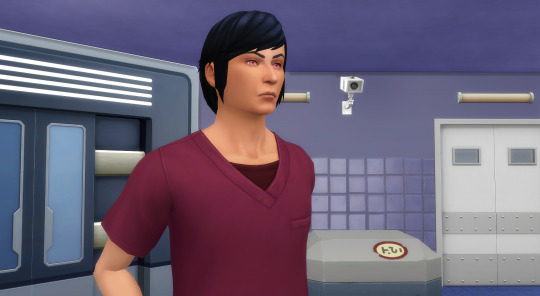
Charles: "That's settled. Before we adjourn, are there any questions or anything else that needs to be addressed?"
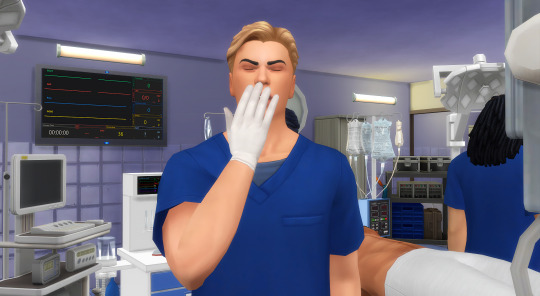
(Bernard draws a loud, obnoxious yawn.) "Can we just go? We're done here; I can practically hear my bed calling my name!"
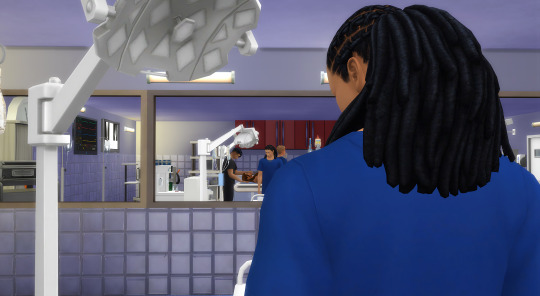
(Daniel remains silent. There's nothing for him to say at this point.)
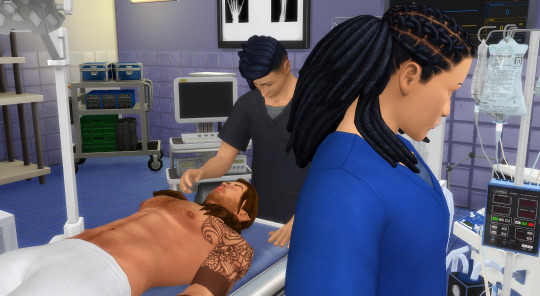
Charles: "Jordan? Is there something on your mind?"
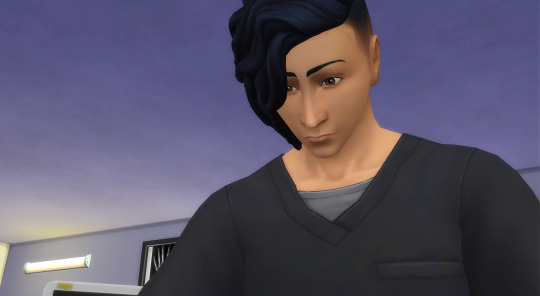
Jordan: "I'm not sure... but I feel something's off here. I know it's probably stupid to even bring it up."
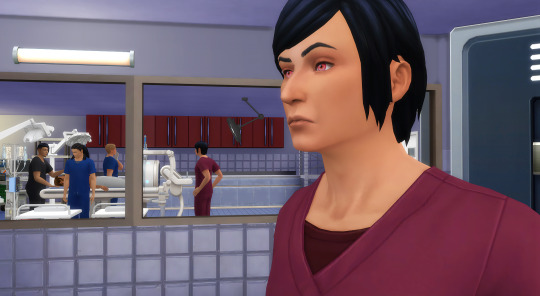
(Charles decides to entertain Jordan. Out of all of his subordinates, Jordan's the most reasonable in their train of thoughts.) "Speak them."
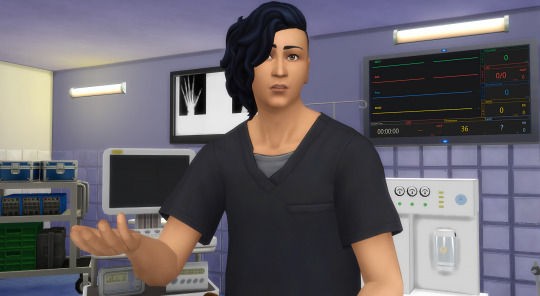
Jordan: "I've recently gone over what little notes and data we have on werewolves -- excluding John, of course. I'm noticing something here."
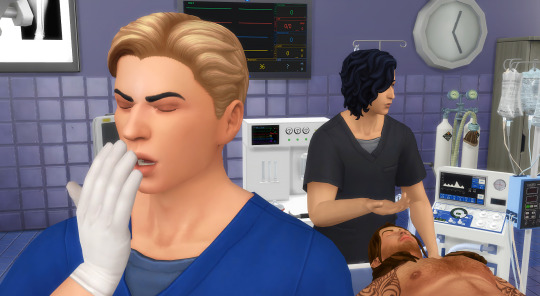
Bernard: "For fuck's sake, Jordan. It's three in the morning!"
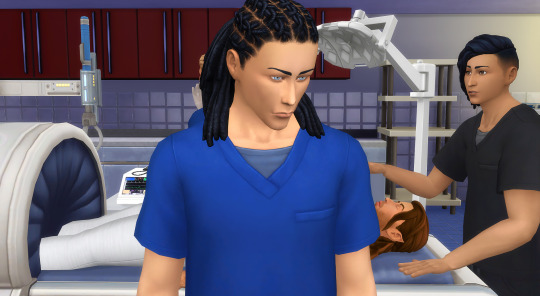
Daniel: "It won't kill you to listen to what they have to say for five minutes, Bernard."
(Bernard groans, "Yes, it will!" before yawning.)
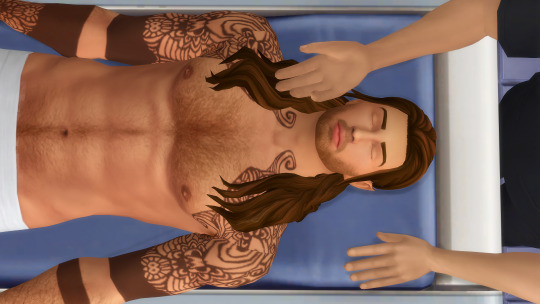
Jordan: "Anyway, it's been said that when a werewolf dies in their turned form--"

"--they involuntarily shift back into their human form."
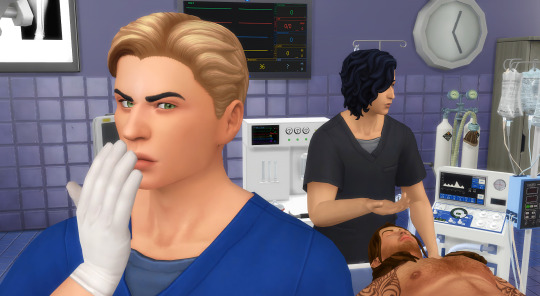
(Bernard stops yawning and looks at Jordan from the corner of his eye. Now that he thought about it, his skin still felt hot when he took that bracelet off. Where the hell are they going with this...?)
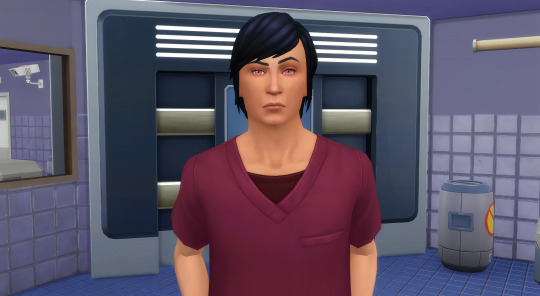
Charles: "What are you basing this on?"
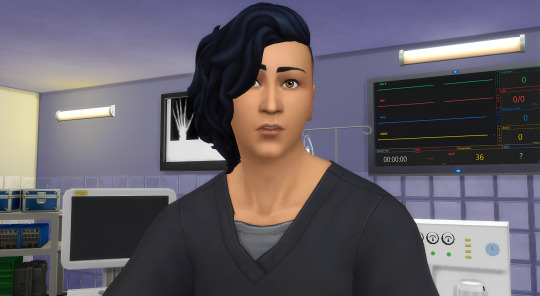
Jordan: "The shift in question ranged between thirty seconds and forty-seven minutes. Even though we worked on John for two hours, he should have shifted back during that time. But that pertained to other types of lycan--"
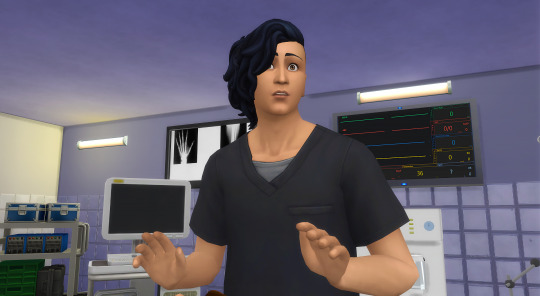
(A realization creeps up their spine and Jordan freezes.) "Wait--John still has his color after all this time. When I moved his head, his eyes... tracked. That's not supposed to happen; he's dead. That can't happen--"
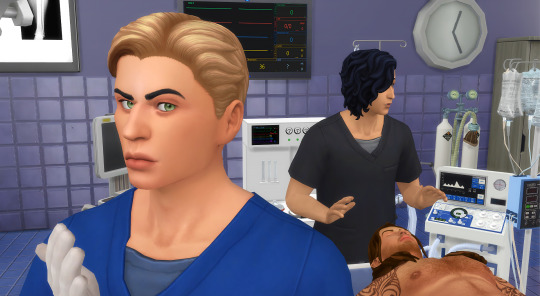
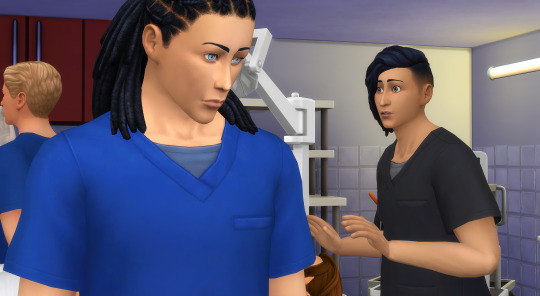
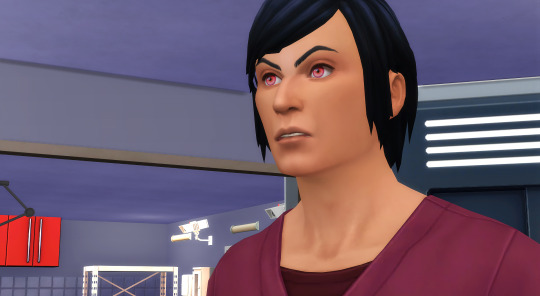
"--unless."

// Next ⏭️
#ts4#the sims 4#sims 4#simblr#sims 4 story#ts4 story#the sims 4 story#ts4 supernatural#ts4 horror#ts4 sci-fi#story tag: memory management#oc: john#oc: the werewolf#oc: jordan#oc: bernard#oc: daniel#oc: charles#oc: mark#oc: thomas#death tw#death cw#gif warning#hmm wonder what that could mean#this is why when someone asks any questions and you see someone about to say shit you tell them to stfu
17 notes
·
View notes
Text
Reference archived on our website (Follow this link to access more than 1,000 open-access studies on covid! DAILY UPDATES)
Vaccination does lower case counts in hospitals, but it also helps to fuel new variant's immune escape if not paired with preventative measures like masking and air filtration.
Abstract COVID-19 vaccine-induced protection declines over time. This waning of immunity has been described in modelling as a lower level of protection. This study incorporated fine-scale vaccine waning into modelling to predict the next surge of the Omicron variant of the SARS-CoV-2 virus. In Hong Kong, the Omicron subvariant BA.2 caused a significant epidemic wave between February and April 2022, which triggered high vaccination rates. About half a year later, a second outbreak, dominated by a combination of BA.2, BA.4 and BA.5 subvariants, began to spread. We developed mathematical equations to formulate continuous changes in vaccine boosting and waning based on empirical serological data. These equations were incorporated into a multi-strain discrete-time Susceptible-Exposed-Infectious-Removed model. The daily number of reported cases during the first Omicron outbreak, with daily vaccination rates, the population mobility index and daily average temperature, were used to train the model. The model successfully predicted the size and timing of the second surge and the variant replacement by BA.4/5. It estimated 655,893 cumulative reported cases from June 1, 2022 to 31 October 2022, which was only 2.69% fewer than the observed cumulative number of 674,008. The model projected that increased vaccine protection (by larger vaccine coverage or no vaccine waning) would reduce the size of the second surge of BA.2 infections substantially but would allow more subsequent BA.4/5 infections. Increased vaccine coverage or greater vaccine protection can reduce the infection rate during certain periods when the immune-escape variants co-circulate; however, new immune-escape variants spread more by out-competing the previous strain.
#mask up#covid#pandemic#covid 19#wear a mask#public health#coronavirus#sars cov 2#still coviding#wear a respirator
50 notes
·
View notes